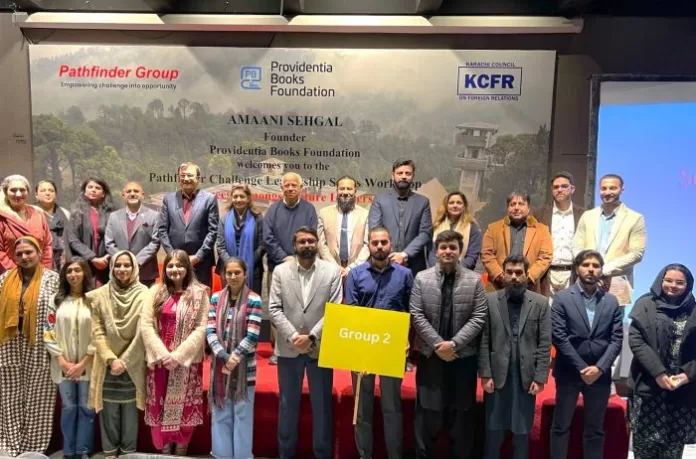Dr Salma Malik (Moderator)
Ladies and gentlemen, thank you all for joining us for the Pathfinder’s Challenge Leadership Workshop today. It is an absolute honor for me to be a part of this enterprise and also to introduce our first speaker, who is going to deliver his welcome remarks. Before that, I would kindly request everyone to maintain silence and put their mobile phones on silent mode to commence with the Holy Quran recitation.
I would request everyone to rise for the National Anthem of Pakistan. To commence officially with today’s proceedings, first of all, I would like to extend our heartfelt gratitude to Mr Ikram Sehgal, the Co-Chairman of the Pathfinder Group, not only for making us rise to the challenge of the Pathfinder initiative but also for inviting us all to his beautiful home and providing the youth of our various universities with an opportunity to witness true leadership. Thank you, sir, for your gracious hospitality. I would also like to extend my deep gratitude to the stellar team led by Miss Sehrish Mustafa, to the various speakers we have in the group, and to our worthy participants and students for joining us today.
I would now like to invite Mr.Ikram Sehgal, the Co-Chairman of the Pathfinder Group, to deliver the welcome remarks. Before that, let me take a moment to introduce our worthy host. Mr.Ikram Sehgal is the Co-Chairman of the Pathfinder Group and the Patron-in-Chief of the Karachi Council on Foreign Relations. He is a distinguished figure in Pakistan’s defence and business sectors. His remarkable journey began with his commission into the Second East Bengal Regiment of the Pakistan Army in 1965. Notably, he became the first Pakistani Prisoner of War to escape from India in 1971. Following his military service, he ventured into the business world, establishing the Pathfinder Group, hence the Pathfinder Challenge. The Pathfinder Group encompasses Pakistan’s largest private-sector security company. Among his many achievements, Mr Sehgal is also a prolific writer and commentator, regularly contributing to national and international publications. He has also served on various platforms including the World Economic Forums, Global Agenda, Council on Counter-Terrorism and the East-West Institutes His unwavering commitment to national security and international
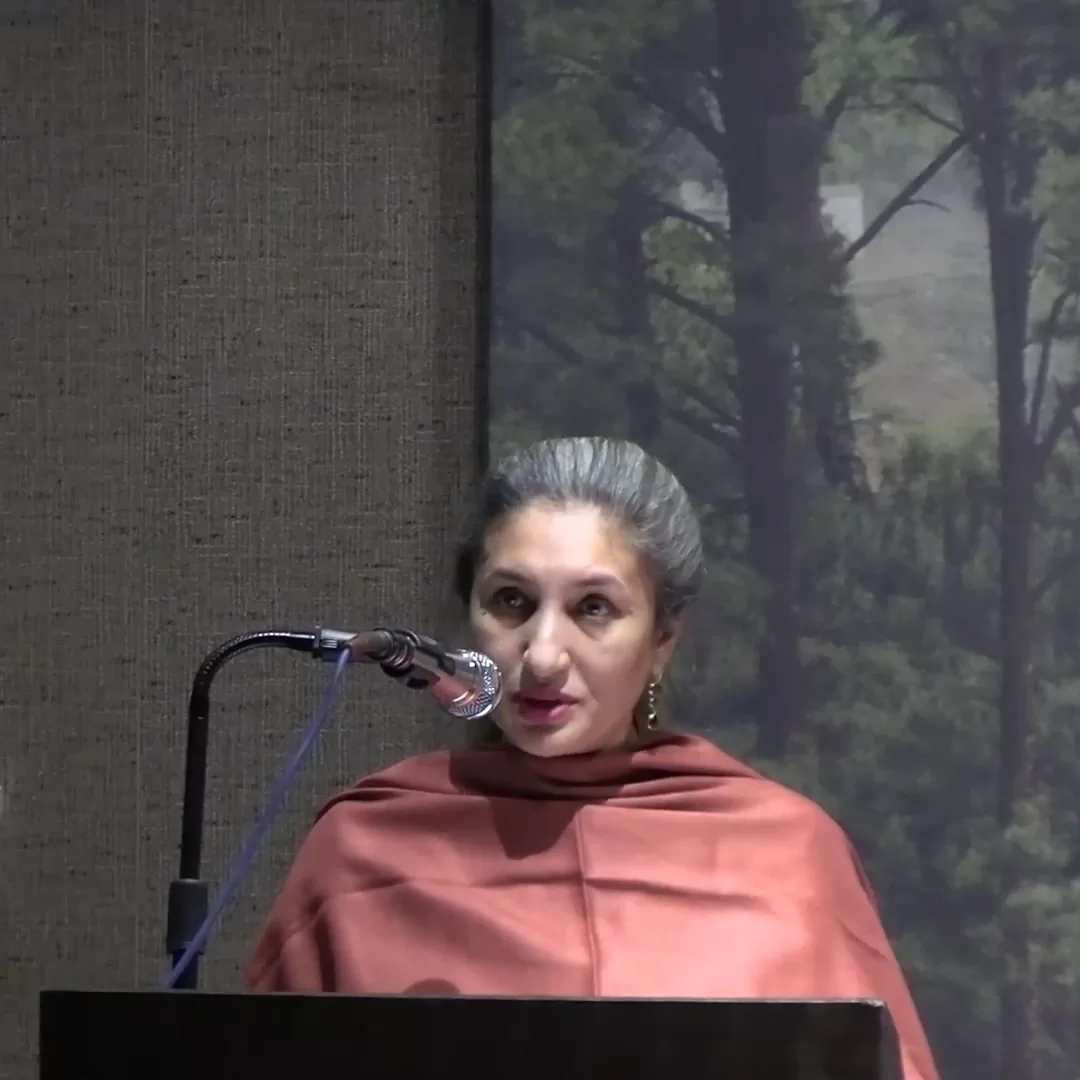
relations continues to inspire many. On a personal note, during one of my recent visits to Dhaka, I found that he is equally loved and liked by the people in Dhaka, which he calls his second home, rather than his mother’s home. He is as much a Bangladesh Citizen as much as a Pakistani citizen. With that, I have the honored to invite Mr Ikram Sehgal to share his views. Ikram Sehgal Co-Chairman, Pathfinder Group Bismillahir Rahmanir Raheem, thank you Dr Sama Malik. First of all, let me share that the idea of this Leadership Series was quoted to me by Air Cmdr. Khalid Banuri. He was mulling over this idea for some time. Both Dr Salma Malik and Khalid Banuri are very close to me intellectually and emotionally. So, it is an honour and prestigious fulfilment of a dream that we can come together and create something useful for the Pakistani youth and eventually for the Pakistani nation because the youth of today, are the leaders of tomorrow. Around thirty years ago, I started building this space, brick by brick. Back then, no one was interested in this area, which made it relatively inexpensive. Over the years, I kept saying, “We can do this. relations continues to inspire many. On a personal note, during one of my recent visits to Dhaka, I found that he is equally loved and liked by the people in Dhaka, which he calls his second home, rather than his mother’s home. He is as much a Bangladesh Citizen as much as a Pakistani citizen. With that, I have the honored to invite Mr Ikram Sehgal to share his views.
Ikram Sehgal Co-Chairman, Pathfinder Group
Bismillahir Rahmanir Raheem, thank you Dr Sama Malik. First of all, let me share that the idea of this Leadership Series was quoted to me by Air Cmdr. Khalid Banuri. He was mulling over this idea for some time. Both Dr Salma Malik and Khalid Banuri are very close to me intellectually and emotionally. So, it is an honour and prestigious fulfilment of a dream that we can come together and create something useful for the Pakistani youth and eventually for the Pakistani nation because the youth of today, are the leaders of tomorrow. Around thirty years ago, I started building this space, brick by brick. Back then, no one was interested in this area, which made it relatively inexpensive. Over the years, I kept saying, “We can do this. We can achieve this.” This was a ravine, and I thought let’s make an auditorium out of this place, and what you see today, is a result of that idea. This place is named after my eldest granddaughter.
As we speak, my granddaughter, who is studying in one of the best schools in the US, has applied to many universities there, and among the universities, she has already received acceptance from are St. Andrews in the UK and the American University. We hope for the best as we await further responses. I hope she does as well as her father did. They both have done much better than me. I am a simple graduate of the Pakistan Military Academy and whatever I have learned, I learned in the parade ground of Kakul.
I am sure that the faculty and speakers that Air Cmdr. Khalid Banuri has gathered here will do justice. This is a remote place but I am sure as more people will come here, they will get used to it and this place will become a center of excellence. By the grace of God, it is now a space for both male and female students, equipped with sports facilities like a tennis court, basketball court, squash court, a well-furnished gym, a swimming pool, and a beautiful mosque that accommodates both males and females separately. My other granddaughter plays tennis in the US and my grandson plays basketball so these facilities are because of them.
Before I conclude, I must thank my incredible staff, who have worked tirelessly to make this event possible. I am also very thankful to Dr Huma Baqai for coming from Karachi. There is fresh juice and lunch prepared for you afterwards and every little detail has been thought of to make your experience here comfortable. I hope this space reflects the vision I had in mind, not just for studying, but for an enriching and complete experience.
Dr Salma Malik, (Moderator)
I would now like to request Air Cmdr. Khalid Banuri to give his opening brief. He is a practitioner and scholar with diverse interests and over 47 years of experience in public service, aviation, nuclear politics and arms control, education, and international law. Mr Banuri has taught in various public sector universities and has a deep interest in training the younger generations in leadership pursuits. Please welcome, Mr Khalid Banuri.
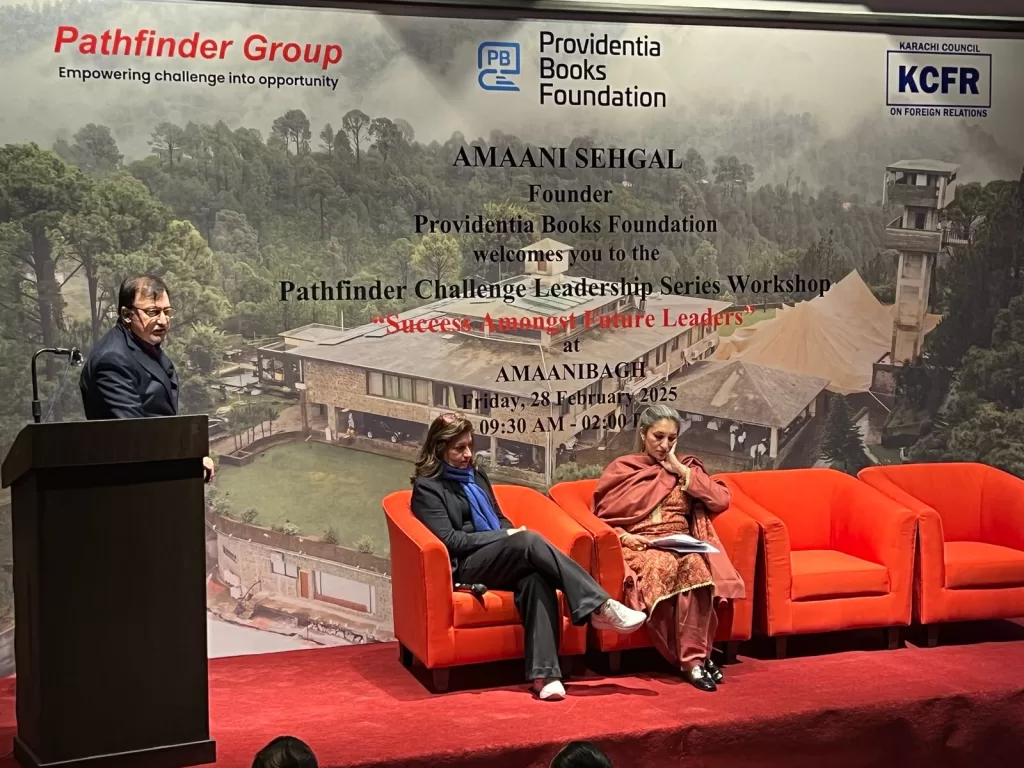
Khalid Banuri Workshop Coordinator
Bismillah-ir-Rahman-irRaheem. Thank you very much for the generous introduction. Winston Churchill was asked by the school that he attended as a child, one of the top schools in the UK, to come back and speak to the students. When he went to deliver his speech, the students were eager to hear the sitting Prime Minister’s speech. This was in the aftermath of the Second World War. Churchill began his speech this way: “Never give in, Never give in. Never, Never, Never, Never.” And then he left. The speech stuck as a profound thought – a kind of idea that sinks in and always stays with you as a display of conviction. I would like to relate this story to what we heard in the opening remarks. I hope some of you noticed that Mr. Ikram Sehgal, in his opening remarks, said this with a ting of conviction, saying “I am sure this place will be a centre of excellence in the future”. He wasn’t just talking about this beautiful infrastructure that he created but also about the substantive contribution this place could make with inspirational thinking and leadership. I would also urge you to look at the slogan that the group of companies that he leads- “Empowering Challenge into Opportunity”. Notice that it perfectly captures the ethos of his conviction.
Turning challenges into opportunities is the cornerstone of Mr. Sehgal’s leadership. I have had the pleasure of talking to people who work for him and learnt about his style of leadership. Such leadership, as indeed of several others in this country, makes one wonder about how one could take such a thought process forward. How do you ensure that the next generation learns and makes fewer mistakes than the earlier ones? How this concept evolves into something that begins with conviction, and high integrity, goes into a quest for excellence that culminates in excellence. And when excellence is achieved, can such experts, scholars, and professionals work together and complement each other? So the notion of team building with sustainability. As you drive through this scenic valley leading to this location, you wonder whether you are ready to take on the challenge. So, how do you move forward then? Perhaps you also want to think about the story about the name ‘Pathfinder’.
The general notion of “Pathfinders” emerged during the Second World War. The people who dared to lead during hostile environments and wars found the right path and guided others through it. I often wonder if in the corporate world, anyone has ever reflected on why Ikram Sehgal chose this name. I am delighted to have university students here in the audience. To them, I say, if you know this concept, deliberate upon it. If you do not, then research it and learn.
As to the question, “How do you develop yourself to accept this challenge?” The process of development starts in four stages: personal growth, interpersonal interactions, and understanding. You eventually become a whole, balanced personality. Once you achieve that, you move to form teams – not just teams, but happy teams. Happy teams eventually evolve into groups that function seamlessly and become organizations.
So, what makes a leader? And what makes a good leader? And if that works for you, what makes a good leader great? These questions spark thoughts. What makes leadership challenging? Are good leaders born or made? There are two different perspectives on this, but I lean toward the belief that anyone can be a leader. However, not everyone should or wants to be a leader. It’s like parenting; not everyone wishes to be a parent, but those who do it with conviction, and develop the necessary traits in their personalities. Also, why is integrity so crucial? Why would anyone want to believe in you as their leader? Why is leadership hard work? This thought leads us to questions about resilience, failures, and the challenges we must overcome. So we decided to take on four topical issues today.
Let us start with a discussion on one of the most pressing challenges, “the Fear of Failure”. Is there anyone in this room who has never experienced a fear of failure? If we are honest, everyone has. So, know or think about, how we address and overcome this fear. Psychologists among us, for example, think about these issues. These discussions guide us in understanding human behaviour better. Where do these thoughts take us? Where does this path lead us as individuals and as a society? These are questions worth exploring.
The things you want to develop and progress into – where do we go from here? If there’s something that can invoke fear or anxiety, is there something I can do about it? Some will give up, and as Churchill said, “Never, never, never, never give in.” So, some might say, “Can you solve this problem? If not, just have some tea and forget about it.” But that’s not the mindset you want to adopt. Instead, you want to tackle it head-on. That is why, we want one of the groups to think critically and work harder about the fear of failure.
We have excellent mentors to guide you along this path. But letting you choose how you want to talk about and address these challenges is entirely up to you. As we look to the future – 2050, 2060 – none of the individuals from the earlier generations, the Boomers etc, would have walked into the sunset. Your generations will be running this country, the academia, the businesses, etc. You will be making those decisions, and hopefully making lesser mistakes. This is why I want you to think more about these concepts and questions. What do I do? How do I address this? How do I get rid of fear?
Consider, for example, what drives a fighter pilot to take to the skies, knowing they are sitting on a burning torch, with thousands of degrees Celsius under his seat? With the enemy ahead, and armed weapons ready, what keeps them going? This is not simply patriotism but a notion more complex. what makes one undaunting in the face of intense challenges, is something called “The Right Stuff.” For this I refer you to a wonderful book by the same name, by Tom Wolfe, whose title says it all. It discusses the transition from aviation to becoming an astronaut. Such thoughts prompt reflection on our tendencies, mistakes, and, more importantly, how to work on self-improvement.
Courage, exploiting strengths, and working on weaknesses are steps forward. The quote, “Puroon ko khol, zamana urraan dekhta hai; Zameen par baith ke kya aasman dekhta ha, (Show your skill to the world by spreading your wings; Greatness never comes by staring upon the skies, if your feet remain entrenched to the ground). Fly high to discover the possibilities.
Another fascinating subject that one group will discuss is “Effective Leadership in the Workplace”. Leadership isn’t just about holding a title, be it any workplace. It is about motivating, inspiring, and leading by example, being an effective role model. A capable leader adapts to challenges and fosters growth in their environment, aiming to create opportunities for others to thrive. So how can you be an effective leader, whether at a university, a classroom, a company, or even a country? Should a leader have empathy or rational compassion? Being only kind without having expectations isn’t good training.
There is this historical account from ancient Rome, where Gladiators would fight against other fighters or wild animals. If you said, “We want you to fight with hungry lions, but we won’t give you a spear to practice, as you might cut your finger while training”, it would be poor advice and poorer training. Training ensures preparation and skill enhancement. Even with sufficient individual skill, teamwork is crucial. Teams create a support system, to build a cohesive force.
Another area to think about is the “Climate Challenges in 2050”. What does the future entail? We want you to think ahead, plan for the future, be mindful, think logically, and incorporate critical thinking. The time to act is now.
Finally, our fourth topic is about “Leaders of character in an AI-driven world”. Connecting ideas, building well-rounded personalities, and maintaining high integrity are keys to trustworthy leadership. Excellence lies in elevating others. This is where you connect ideas to become a well-rounded personality.
How can you be ethical in your approach? High integrity leads to trustworthiness, and trustworthiness leads to good leadership. The quest for excellence lies in lifting others, which defines leadership. How does technology challenge this notion? This is an area one group will deliberate upon.
Finally, let me mention this idea “I think, therefore I am.” There are numerous areas to explore, and we’ve selected four topics for today.
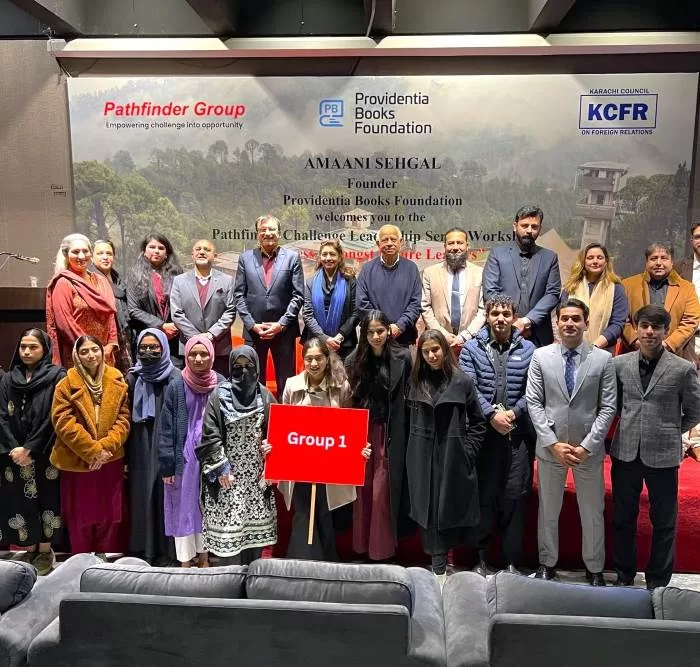
Team Red, your challenge is leadership and character in the world of AI. Representing universities and different institutions, your group consists of individuals from middle-level and final-level semesters. Some have studied the subject in-depth, while others have not. You have excellent mentors for this challenge.
Team Yellow, your topic is fear of failure. You have two excellent mentors guiding you through the fear of failure. The pattern is similar – universities and institutions represent, both experienced and fresh minds working together.
Team Green, your focus is on climate and the future. What are the challenges climate change presents, and how do you think independently yet work collectively? Today, you must put your heads together to deliberate and innovate. You have two brilliant mentors who specialize in this field.
Team Blue, your challenge is effective leadership in the workplace. You represent two universities and additional young professionals. You have excellent moderators and mentors guiding you. Effective leadership involves rational compassion, ethical decision-making, and fostering teamwork.
Let’s rock and roll people.
Dr Salma Malik (Moderator)
Now, let me introduce our keynote speaker, Dr. Huma Baqai, who is here to enlighten us with her insights. Prof. Dr. Huma Baqai is the Rector of the Millennium Institute of Technology and Entrepreneurship, Karachi. She is the Vice-Chairperson of the Karachi Council on Foreign Relations (KCFR). Dr. Huma is a seasoned educator, researcher, and corporate trainer with over 25 years of experience in academia and media. She has three books to her credit and over 45 research articles. Her contributions span research articles, opinion pieces, and chapters in academic publications. Today, we are privileged to have her share her thoughts on leadership and its evolving dynamics.
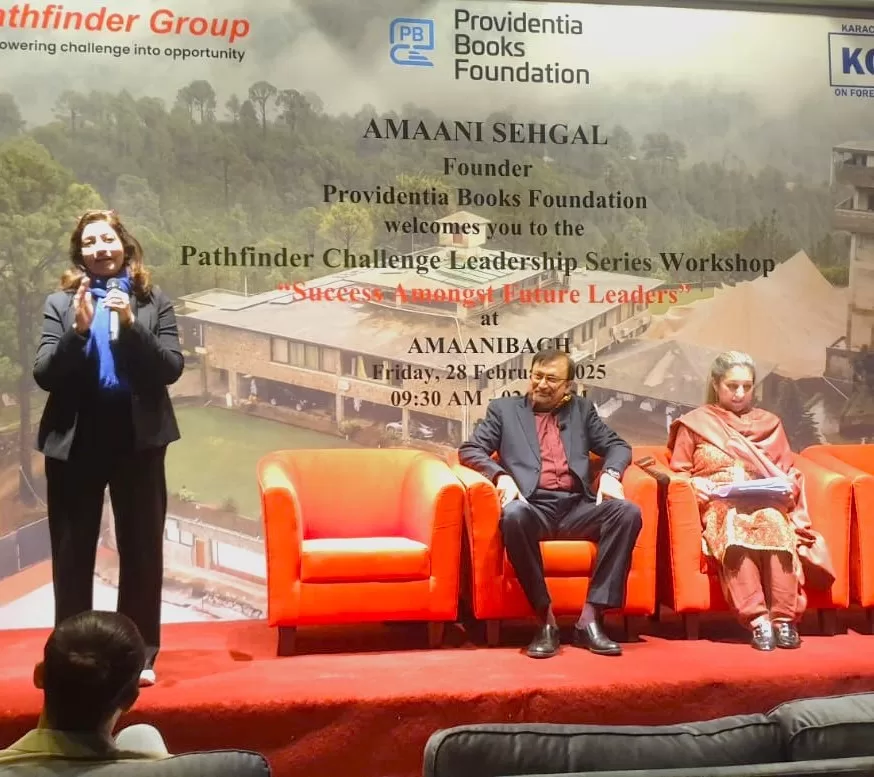
Dr Huma Baqai Rector, MiTE University
I can never say No to Mr Ikram Sehgal and that has been a thing for the past 20 years, when Mr Sehgal calls I come because I have a lot of respect for the kind of work he is doing. And today once again he surprised me and I will tell you why he surprised me. When I was a little older than you I was a young lecturer at Karachi University and I was picked up by a German Foundation to go and spend six months in an Academy of Leadership in Germany. I went there for one training, then was subsequently sent for a second and a third training. Those times spent at the Leadership Academy have shaped who I am today. I tell you, the opportunity to get exposed to what leadership is all about – it’s not about power, it’s about earning respect and working hard. I’m going to walk you through a small presentation that I’ve developed. I’ll also be happy to answer questions during the group discussions because this is what I do – I’m a trainer.
Understanding the difference between the “Crisis of Leadership” and “Leadership in Crisis” is crucial. By the way, this isn’t just confined to Pakistan. As I speak to you, this is a global phenomenon. There are either no leaders or the leaders we have don’t seem to know what they’re doing. Be it Trump or others, I don’t want to name names and get into trouble, but that’s the reality. So, what is leadership? Simply you can be short, tall, charismatic, or not-so-charismatic, but you must embody one thing: leadership is a contact sport. You can’t be a leader sitting in your office or an ivory tower. Leadership is about building connections and getting to know people more and more. To me, leadership is a contact sport.
Secondly, anyone can be a leader, but to be a leader, you must have followers. Leadership is defined by three outcomes. If you achieve those, you will have what I call influence and to have followers. You need to have direction, alignment, and commitment. The biggest crisis of leadership in today’s world is the lack of alignment with the aspirations of the people being led. For example, Trump gave a sense of alignment to a group that mattered – the white supremacists.
Amid all the liberal rhetoric, they felt aligned. Whether or not their aspirations were reflected, they felt connected. And then, of course, there’s commitment. Trump became president, was defeated, fought back, and returned with a vengeance. He created a narrative of not being defeated. Similarly, they could put Imran Khan behind bars, but they couldn’t take him out of the minds of the people. I’m sorry, but Imran Khan is a very average leader and statesman. However, he has aligned with the aspirations of the people and seems to have unwavering commitment. Leadership can be defined as a social process where individuals work together to produce results that can never be achieved alone. Leadership is a contact sport. If you’re a leader, you must have a team. You must build trust with your team, and they must trust you. Leadership in the workplace is a set of mindsets and behaviors that align people in a collective direction, enabling them to work together, accomplish shared goals, and adapt to changing environments.
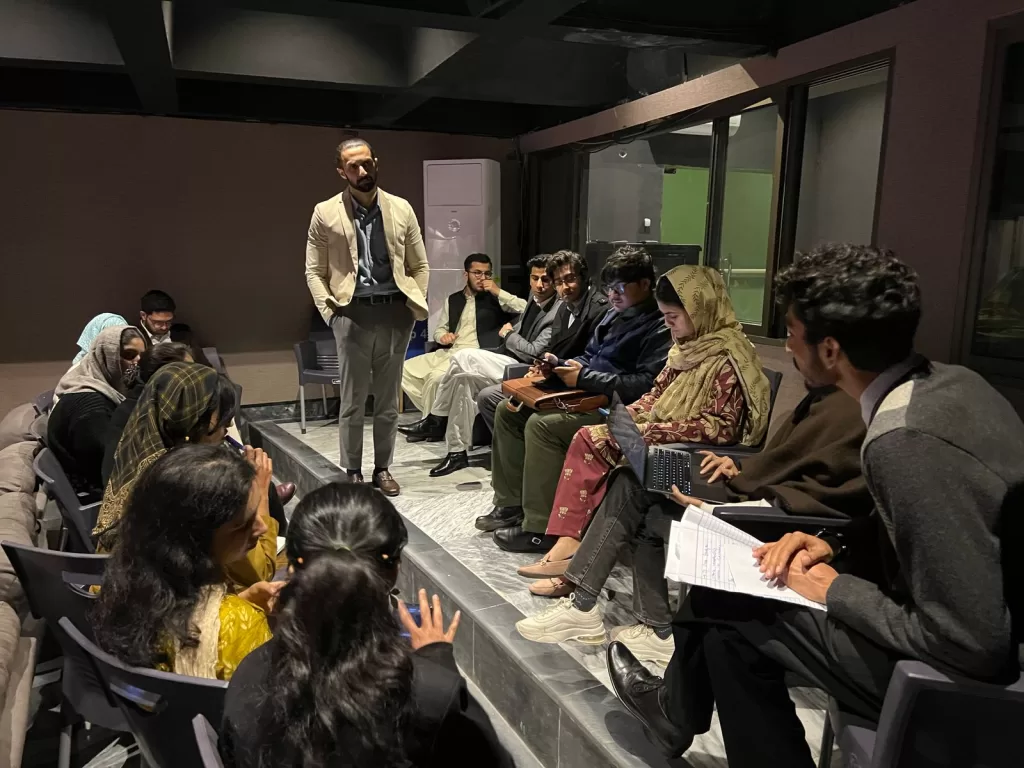
Another critical trait of a good leader is adaptability. You can’t be rigid. Leaders change every second, every day. They are not reactive; they are responsive. A good leader is always responsive to what’s happening around them. Being responsive means being adaptable and flexible. Having flexibility is a great skill. Leadership is the ability to influence and guide others to achieve common goals. Create goals that resonate with people, something that touches their hearts. Leadership evolves into inspiring, motivating, and enabling others to contribute to the success of a group, an organization, or a society. So we are collapsing as groups, we are collapsing, some of us, as an organization and of course, collapsing as a society. And why it is especially true for Pakistan? Pakistan is a wonderful country. Look at where you’re sitting – it’s created by an individual, SIUT, created by an individual, and several such islands of excellence. But why does such excellence proliferate? Why as individuals we are amazing, and why do we fail collectively? Is that a crisis of Leadership? So Leadership has always been about navigating change, making critical decisions, and guiding teams toward success. Remember, if you’re a good leader, the failure is yours, and the success belongs to the team. You can never blame the team for failure because leadership is about taking responsibility.
However, in recent years, the challenges leaders face have become more pronounced and multifaceted. These challenges can be classified into two major categories: the crisis of leadership and the leadership in crisis. The crisis of leadership refers to the systemic failure of leadership structures, strategies, and mindsets to keep pace with the complexities of the modern world. This is a new world with an explosion of information. You can’t restrict or regulate it; you must flow with it and move forward. For example, there was a lot of uproar about the huge advertisements done by the Chief Minister of Punjab about her one-year performance. The society revolted, saying it’s not acceptable to spend taxpayers’ money on this. The reaction was that Imran Khan used to do it and others have done it in the past. But you have to stop living in the past. This is a new world – a world that hits back. Your target audience is no longer passive. They react, respond, make choices, and reject unless you resonate with them. That’s exactly what’s happening.
Leadership in crisis occurs when leaders must react to high-pressure situations that demand immediate responses and adaptability. The pace of change in the last 70 to 80 years has accelerated dramatically. The change that used to happen in a century now happens in a decade. Leaders struggle to respond to this new youth, the new information paradigm, deepfakes, and other challenges. How do they respond? By coming down, like WikiLeaks. Remember WikiLeaks? Everything came out in the open, even what Hillary was saying to others. Leaders just don’t know how to respond to this. Responding means you have to address a situation.
Alright, this is interesting – there’s been a lot of research on this. This is the first time I’m presenting it to an audience, and of course, this isn’t solely mine; I’ve referred to several sources. But it’s something very fascinating. To better understand how these crises, manifest in today’s world, we can analyze them through several prominent frameworks that describe the evolving nature of the environment. What is the change we’re talking about? What’s happening here? This begins with VUCA and leads to SPOD.
I’ll provide you with dates, and you’ll understand what this means. Yesterday, I attended a CEO conference where they titled it “Leadership in VUCA Times.” What is VUCA? The VUCA world dates back to the late 1980s and early 1990s. At yesterday’s conference, they discussed “VUCA Times,” and I was one of the speakers. I said, “These VUCA times have passed because that was the 1990s.” We’re now in a new world, talking about 2025. So, what was the VUCA world? It was a world characterized by volatility, uncertainty, complexity and ambiguity – the world we lived in was volatile, uncertain, complex and ambiguous.
We then moved to what we call the TUNA in 2016. The TUNA world represented turbulence, uncertainty, novelty, and ambiguity. In 2016, it was realized that we needed to respond to these situations. A new word was introduced novelty. If you do something new, in a novel way, perhaps you can better respond to the masses. Then, in 2019, we entered the RUPT world (Rapid, Unpredictable, Paradoxical and Turbulent). From 2019 onward, the world became highly unpredictable. Who could have anticipated that a virus would shut down the entire world and force us to adapt to new constructs? The RUPT world introduced rapid, unpredictable, paradoxical changes – what holds today may not hold tomorrow. Leadership styles and responses had to evolve just as quickly. It reflects an increasingly rapid world. One of the biggest challenges we face today is not merely the concept of change but the pace of change. How many of you participate in rapid-fire exercises, my students? The world has become rapid-paced, and this impacts how we think and act. By 2020, another paradigm emerged – more acceptable now – the SPOD world. It refers to Stability, Predictability, Order, and Determination. This world is considered the ideal future but hasn’t been realized yet. Today, the crisis level and the framework through which we analyze it bring us to what’s now called the BANI world. What is the BANI world? It is brittle, anxious, nonlinear, and incomprehensible – things are breaking apart, fragmenting. Governments, democracies, liberal market economies, and the trust between the state and society are collapsing due to growing deficits.
We live in a fragmented, brittle world. Leadership must either find ways to maintain stability or reinvent systems altogether. The challenges are immense. As an educator, I never imagined that mental well-being would become such a massive issue for 20- and 21-year-olds. Parents come to my office, saying their children need help – they’re on anxiety medication. You’ve all heard of the Karachi drug crisis – the widespread use of cannabis. In some areas, every second household is affected, with individuals selling drugs to every third person under the age of 25. Why does this generation struggle so much? Telling them to “say no to drugs” isn’t enough. We need to address the underlying anxiety and figure out why they resort to drugs. This is a critical issue. Anxiety among young people is unprecedented and deeply concerning. Non-linear unpredictability is another concern.
In the past, actions had predictable consequences, but now, what you do may not yield the expected outcome. This unpredictability has rendered triedand-tested methods ineffective. Linear approaches no longer work. Ishrat Hussain once wrote a book titled Governing the Ungovernable – it was about Pakistan. Today, this concept has extended to the global stage. Governance, liberal democracy, and market economies are struggling to survive. The paradigms of liberal democracy and market economy seem to be collapsing, I was in Boston for a conference they said we need to work and live with capitalism but it is from greed-driven capitalism, which has shown to be excessively exploitative.
The call now is to transition from this exploitative capitalism to one imbued with conscience, capitalism must evolve into a more conscious, ethical framework. Wealth concentration as it exists today cannot continue. We need inclusive governance and leadership that doesn’t draw strength from a handful of people, whether in Pakistan or the United States. This generation demands equity and fairness, not equality in leadership. Equity resonates with people, and it’s what will succeed. Leaders who can pitch equity and fairness, not equality, not equality anymore? Equity is what is going to sell, okay?
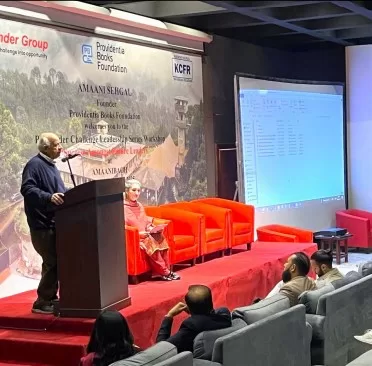
And then, of course, the last – SPOD world, stability, predictability, order, and determination. This world hasn’t arrived (at that state yet). We have to work towards a world with stability, predictability, order, and determination. This I’ve done. The best leaders are those who embrace change, encourage new ideas, and build a better future. Quick one word on the recurring theme of 21st-century leadership. It is to relate, create, instigate, manage, and work with change. Command-driven leadership is obsolete. Today’s leadership must be participatory, ownership-driven, and focused on transformation. Young people need to take ownership of Pakistan’s future. Without their engagement, meaningful progress is impossible.
Lastly, we must discuss future-proofing leadership. It’s not about addressing today’s challenges but preparing for what lies ahead. Future-proofing is the keyword for today’s leadership discussions. Unless we engage people under 40 in leadership structures, ownership and progress will remain elusive. This is the way forward – youth engagement is critical. People must understand that we need to pass on the torch to the younger generation, or else progress won’t happen. To the young people sitting here, the torch is yours to carry forward.
And I’m going to stop here because Pakistan’s leadership crisis is a critical topic. I want to show you highlights of Pakistan today being in the throes of a poly-crisis – multiple crises, including political, economic, institutional, and constitutional. All these crises are currently overlapping in Pakistan. By the way, “polycrisis” is also a term introduced in DAVOS two years ago – I was part of that construct – and then it went viral. It became a term that described the overlapping crises leading to a bigger challenge than any single crisis. Pakistan doesn’t face just one crisis anymore; there are multiple crises, and we need a multi-pronged approach to resolve them.
Governments in the recent past have merely muddled through without a plan or strategy to deal with long-standing problems. We have a “fire brigade” approach, addressing only symptoms rather than diving deeper into the root causes. Today, the country seems to lack direction and means to meet challenges or inspire public confidence about the future. Ladies and gentlemen, thank you for being so attentive.
Dr Salma Malik (Moderator)
For the plenary reflection segment, we have four distinguished speakers who will provide five-minute brief expert insights into their respective fields. Each speaker will share their thoughts on the leadership challenges highlighted by our group leader, Mr Khalid Banuri. First, I’d like to invite Mr. Imran Jattala. he will discuss the fear of failure and overcoming setbacks. Imran Jattala is the founder of the National Incubation Centre for Aerospace Technologies (NICAT). He is an eminent figure in the global innovation landscape, recognized for his pioneering work in establishing South Asia and the Middle East’s first Aerospace and DeepTech Incubation Center. He is a passionate advocate for innovation. He has been instrumental in leading large-scale innovation programs across Pakistan and the MENA region. His leadership has impacted over 25,000 entrepreneurs and university students, guiding more than 700 startup teams to success and facilitating over $10 million in investments in Pakistan. With an ambitious goal of positioning Pakistan among the top 50 innovative nations by 2030, Imran continues to inspire and mentor the next generation of innovators. Over to you Mr Imran.
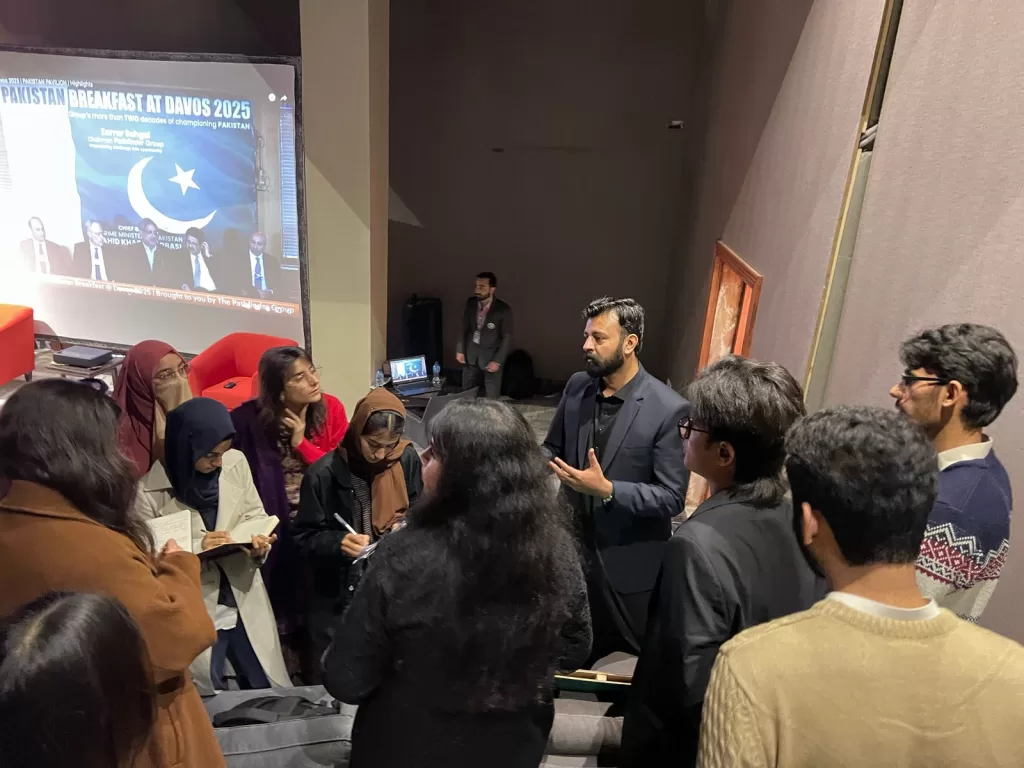
Imran Jattala Project Director, NIC
Thank you very much Mr Khalid Banuri, and Ikram Sehgal for putting up a wonderful event. I am honored and humbled to speak about the Fear of Failure. My only expertise is how to fail. And how to fail well and that’s what I am presenting. I always tell my team to leave failure for me, and just focus on their work. I graduated in Electronics Engineering from Air University in 2006. I then worked for ten years with the Ministry of Defense, finally realizing eventually that engineering wasn’t for me. I pursued an MBA from Hult Business School and have spent the last ten years practicing innovation. I’ve been building incubation centers, and the last one we built was the National Incubation Center for Aerospace Technologies (NICAT).
Today, I’ll share my story about the fear of failure and how to overcome it. The purpose is for you to realize that the fear of failure is a universal experience – something we all face. Overcoming it is the key to living a fearless life. How many of you know about Raja Porus? He was the local ruler who challenged Alexander the Great near Jhelum. Despite being defeated, Raja Porus showed how a king should treat another king – with honor. Khalid Banuri advised me against mentioning names, but even our previous Prime Minister often said, “The fight happens in the mind first.” You lose in your mind before you lose never, never, never. Fight in your mind. Have you ever failed in life? Of course, we all fail – that’s the reality of life. Overcoming fear is the first step to achieving a fearless life. Living a truly fulfilled life, as self-actualization suggests, is about conquering these fears. Allama Iqbal’s concept of “khudi” (self-awareness/self respect) far surpasses the concept of self-actualization. It represents a broader, deeper philosophy. Once you start living fearlessly and giving up your fears, you can achieve extraordinary things. Never give up unless physically incapacitated. Elon Musk says, ‘I will only give up,’ and I’ll be incapacitated. My legs are not moving, I can only then give up.
Let’s discuss Nike, there’s a story behind it. Phil Knight, the founder of Nike, started selling shoes from his car trunk. He started very small. We’ll connect this to why you need to start small. The beginning of living a fearless life is setting very big goals in your life. Set a goal so big that it consumes your life. Your goal should be much ahead of you. The problem with the majority of people is they set small goals in their life and the tragedy is they achieve them, and then they spend the rest of life stuck in getting a 50k or 1000k dollar cheque from the bank. That was their goal. Your goal should be this big that your life gets consumed in achieving it. The human mind makes nearly one decision per second. The decisions you make are your conscious choices. Humans live through conscious choices. Out of the 18,000 forms of life on Earth, only humans can consciously make around 35,000 decisions per day. This unique ability distinguishes us as “Ashraf-ul-Makhluqat” (the noblest of creations). Humans can decide, “I want to live a different life,” and through a series of conscious decisions, you can transform your life.
Everything we call life today was created differently at some point. We’ve built environments, learned how to fly, and adjusted our eating habits. Each of you has this ability. Every student can become a superhero or a superhuman. There’s no limit to what you can achieve. It’s incorrect to believe that women can’t do business or grow in their careers. You can break those societal limitations, change them, and become one of the highest achievers through a series of conscious choices. Allama Iqbal wrote about this concept in a research paper in 1909, inspired by a verse from the Quran that states, “Those who are friends of Allah have no fear or grief.” Human life is designed to operate between two extremes: fear and grief. Think practically – on one side, we have fear, such as the fear of an accident happening to our car. On the other side is grief, the experience of loss when that fear materializes. We spend our lives oscillating between these two boundaries. Self-actualization occurs when you rise above these extremes. This verse encapsulates the idea that once you are free from fear and grief, you can live fearlessly. A fearless life is more productive and fulfilling.
Why is fearlessness essential? Fearlessness and courage make you happy. The ultimate purpose of life is happiness. The American Constitution aptly interprets this as “the pursuit of happiness.” No human wants to live in pain – whether that’s hunger, lack of necessities, or physical pain. We spend our lives avoiding pain and seeking happiness, which often comes through fulfilment – working meaningfully and contributing to society. A productive life is a fearless life, and this is why it’s possible. Now, why do you need to be fearless? Fearlessness and courage – fearlessness and courage make you happy. What is the ultimate purpose of life? The ultimate purpose of life is to be happy. And the pursuit of happiness – the American Constitution decoded this correctly. It’s the pursuit of happiness because no human wants to be in pain. Just imagine, would you like it if you were in pain, (if the pain) continued? Pain can be in any form like hunger, lack of something, and physical pain, we spend all of our life by avoiding pain and seeking pleasure, actually seeking happiness. So, if you want to seek happiness you deserve a reward for your efforts and work. To achieve a state of happiness, you need fearlessness and courage. Master Tiles is a great example – it started small, producing tiles from ceramics. A potter is now a successful entrepreneur. Service Shoes is a glorified Cobbler, and Halib Ltd is a milk seller. Think big but start small. This paradigm shift can lead to great success. Thank you very much.
Dr Salma Malik (Moderator)
Now, turning to climate advocates, I would like to invite Mr Talha Tufail Bhatti. He is an Environmental Scholar, heading the “Strengthening Regional Climate Resilience” program at the Institute of Regional Studies. His interests are climate change and environmental governance policy. He also holds analytical skills for regional and global climate dashboards, and has co-authored reports for multilateral donor agencies. He taught undergraduate programs for 3 years in multiple federal universities including Quaid-e-Azam and Bahira University. Talha has produced more than 300 climate-informed advocates in the past 5 years.
He regularly publishes short articles in print media on multiple topics including climate breakdown, climate security, finance for resilience, and regional diplomacy, and also appeared on national and international media outlets like PTV World, PTV News, VOA, FM Suno, Times etc. Talha please share your views.
Talha Tufail Bhatti, Environmentalist
Thank you so much, Madam. It is an honor to hear such words from you. As an environmentalist, I will open a small window for all of you that what is exactly happening in the world. Climate change is not a new reality it has been happening since the formation of this planet. The main problem lies in the frequency and intensity of these changes which we have witnessed in the last 180 years, and this is somehow the visualization of that. The important part is to see what happened after 1980. From a scientific level, I believe that we entered the age of humans after 1952, but after 1980 we started getting much clearer evidence. When we feel sick, we go to the doctor. When we took the planet to the doctor, they told us that six out of nine planetary boundaries were not within the safe working limit. I am not here to tell you what to do, but I am her to tell you what the grounds we are in right now. So, six out of nine planetary boundaries are not in the safe working limit and the seventh one is also entering into it.
Oceans are the thermostats of the planets, currently, they are not even warm but boiling. Water has an enthalpy, when we put it on a stove it never gets warm immediately it takes some time, but once it’s warm it stays the same for a long and that is what exactly happening on the planetary level that our oceans are boiling, even if we reduce emissions today, the oceans will remain warm for coming twenty years. Due to the changes occurring on a planetary scale in our earth system, we have tipping points and some of them are already active. One of the most critical issues we need to understand is the changing monsoon patterns. These patterns have changed recently and we have lost the predictability. For example, Islamabad hasn’t experienced rainfall since October, now it is raining in the months that never happened in the past. These rains are meant to be in December, but we are having them in February which is very alarming.
All of this is happening due to the consumer lifestyle we have around us. We are living in a time where we are producing and consuming similarly. When we talk about consumption we always say that industry or agriculture is the problem, but the main problem is our lifestyle. 70% of the emissions we produce stem directly from the way we live our lives. Many of the conveniences and luxuries we’ve created for our well-being have directly contributed to the problem.
The last year was remarkably alarming because one-third of the year was beyond 1.5°C which is the threshold limit. It’s not a political limit but a scientific one, which needs to be remembered. I am afraid the way we ignored the first day in 2016 and then the one month of it, and later things got worse over time. Similarly, I believe if we keep moving in the same direction now, repeating the pattern of neglect, we will forget that last year we crossed this 1.5°C threshold and we have entered into remarkably unstable conditions.
Why am I mentioning this is unstable? Because after July 2023 the conditions are horrible. Every month is breaking the records which we have over the past 150 or even 2000 years. Each passing month is becoming warmer and more intense. Specifically, the last two years have been remarkably alarming, even for the scientific community, because climate models didn’t predict these events. The model had predicted it for 2060 but instead, it is happening in 2024. Things are moving rapidly in that direction.
Why am I saying this? Because, when we go for the attribution studies which in the scientific world are done to check whether this event or disaster happened due to climate change, or is meant to be happened naturally by the system. We now have scientific and peer-reviewed evidence that the events we are witnessing are intensified due to climate change and human footprints. These intensified disasters were evident throughout 2024.
Here I just want to give you the review of only one month of 2025 which shows the alarming records. As per the data sets the total recorded cost of natural disasters damage around the world in 2023 was approximately $220–230 billion. The fires we have witnessed in Los Angeles alone cost a loss of around $270 billion, which shows that the damage we have witnessed in a year is happening in a week. Our region is alarmingly impacted by climate change, and the events which we are facing today may happen in Europe 40 years from now. The conditions we are facing right now include heat waves, massive crowds, and air quality indices exceeding 3,000 which is not hazardous but lethal. This is not just happening in Pakistan but across all eight regional countries.
Our glaciers in the north, which were acting as thermometers for us, have now crossed their tipping points. A tipping point is like pushing a table to a limit but once we push it too far, gravity takes over, and it falls naturally. Similarly, we’ve passed the tipping point for the Himalayan-Karakoram (HK) region. This creates the timeline for us that whatever we do right now in the next 200 years will see the loss of 40–60% of the ice mass in the HK region. This is very alarming. We tend to witness this in a manner that once they colonized us and gave us tax levels in which all our leaders saved their money, and now they are coming back for the cheap carbon markets because we don’t have any relevant data sets with us. Climate change discussions are happening globally, but rapid actions are not taking place. Why am I saying this? Because $7 trillion in subsidies were provided to the fossil fuel industry, one of the largest culprits for all of this crisis. Then we see a typical mindset where scientists spend lifetimes conducting critical research but then a gentleman comes and says that Twitter is showing something else. The learning capacity needs to be improved all over Pakistan, since we have very little capacity but global leadership often falls short in taking decisive action. Thank you so much ladies and gentlemen.
Dr Salma Malik (Moderator)
Thank you very much, Talha. This was extremely alarming and requires serious actions from our side. Now we move on to our third speaker Air Vice Marshal Asad Ikram, who is an experienced professional with more than 36 years in the aviation and aerospace industry and academia. Skilled in research and development (R&D), product realization & qualification, academic-industry collaboration, and contract negotiation. Asad Ikram has strong team development skills with a Master of Science in Electrical and Computer Engineering (MEMS & VLSI) from Purdue University, USA. He is currently working as DG Innovation in National Radio Telecommunication Corporation. Sir kindly share your views.
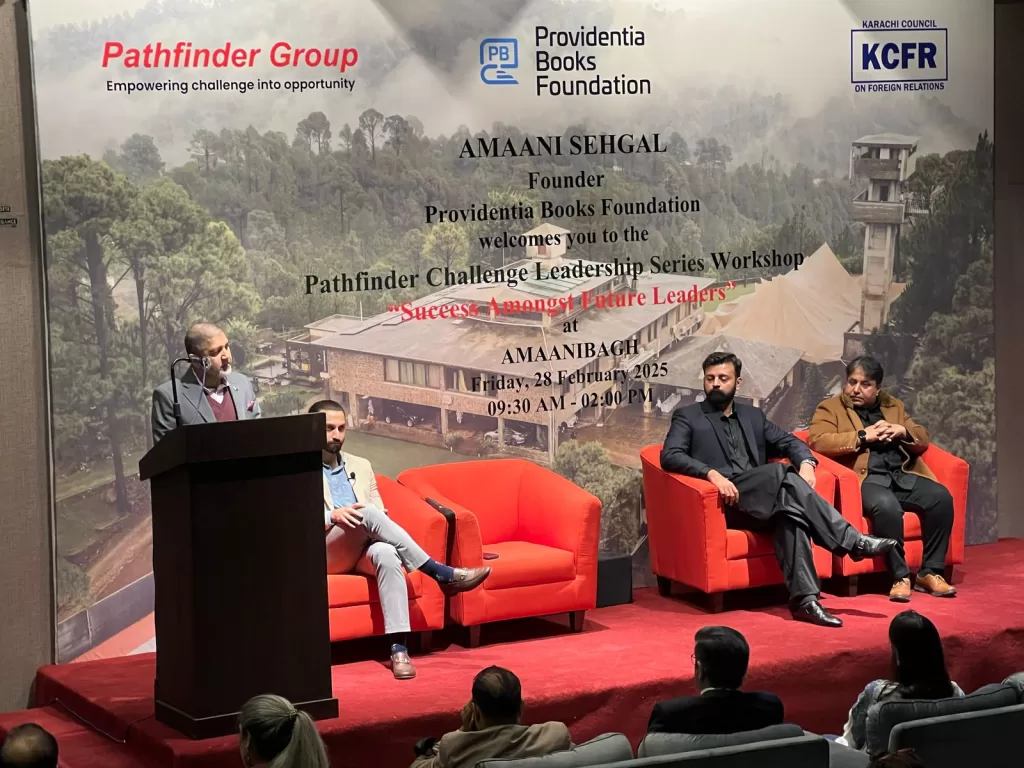
Air Vice Marshal (R) Asad Ikram DG Innovation, National Radio Telecoms
Thank you Dr Salma, Ikram Sehgal, Dr Huma Baqai and Khalid Banuri. Asalam-o-Alikum, ladies and gentlemen. It feels great to be here in this wonderful place, and also especially seeing the young and wise audiences which we have with us over here. I am also very thankful to Dr Huma as she covered a lot of stuff that I wanted to talk about in a much more professional way. Technology is something that has been changing, actually started from the discovery when we landed on this planet, from a rock making it to the chisel and then using it to build houses or to kill people and so on. The technology has been changing all along. In recent times the pace of technological change has gone up, in so a fast manner that humans could not be able to cope with the right policy. Then we have also been taken hostage by people who are not true leaders because leaders are the ones who are supposed to set the stage for the future of society. We have seen that one can either use nuclear energy for peaceful purposes or to kill millions of people. Our ability with technology to do well or to harm has increased. For example, we can use aviation technology to feed millions of people across continents or to deliver weapons. The same is the case with the new technologies that are taking place. All of us use Artificial Intelligence in the form of ChatGPT, DeepSeek etc, but the way we use it is important.
People who lead us are important because they are the ones who set the tone of how we use that technology it can either be used to deface or enable humanity to do well. This is the point where the fundamental principle of leaders comes in with things like integrity, equity, justice, fair play and inclusiveness. For instance, if the algorithms for developing an AI application are made by white supremacies can bring a lot of bias in its outcomes, similarly, if the same team is more inclusive with the people of different races developing it, the developed algorithm will be more beneficial for a larger sector of society.
Similarly, biotechnology holds immense potential, it can be used to do genetic engineering for increasing life or be misused for harmful purposes. Quantum computing can either be used for weather predictions or on the other hand can be used for cyber security. The list of possibilities goes on.
In the end, the more important thing is as an individual how we look at ourselves, because each one of us is a leader in its own right. As Pakistanis, we must think about why are we not able to lead the world even after being the 6th largest country in the world and having 250 million population. We have always been told that America is the superpower and that we can only be the regional power, this is all because of the mindset which we have for thinking and acting like a superpower. We all need to start thinking as a superpower on every level of society, whether it’s an organization, university etc.
In the end I just want to mention the difference between a leader and a manager for the understanding of the young generation. A leader is someone who navigates you towards change and a manager will always promote the status quo, people always make you a manager but you have to be a leader. A leader always give space to others for work and also promotes the team effort. Thank you so much.
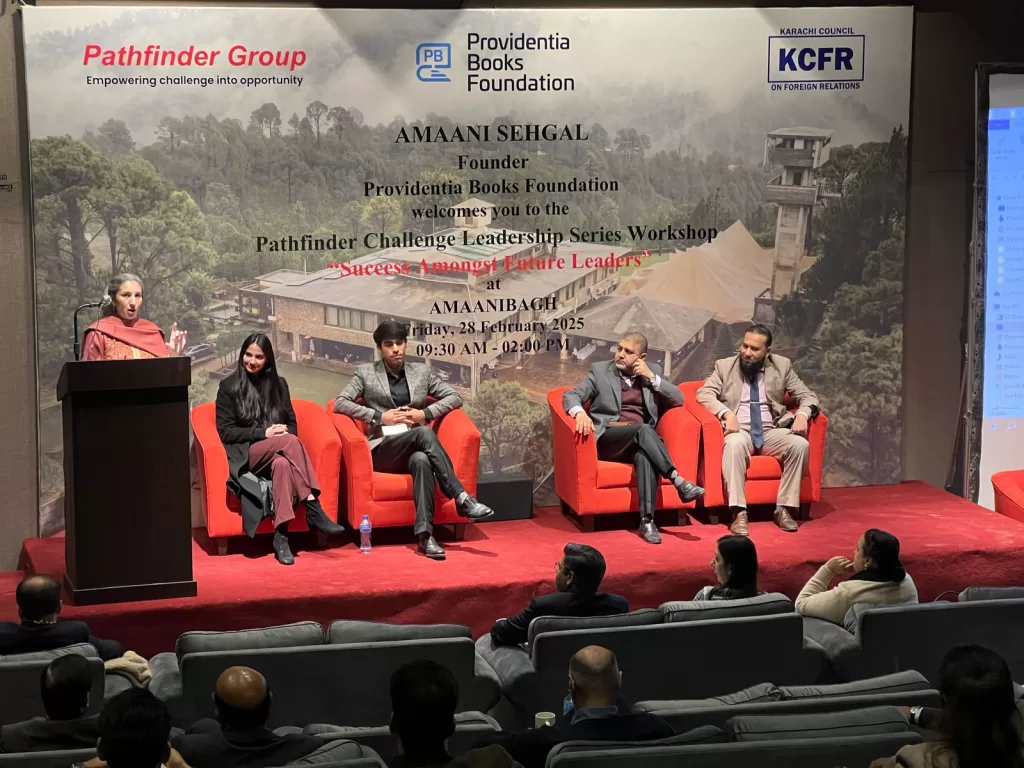
Dr Salma Malik (Moderator)
Thank you so much Asad Ikram for sharing your views. Now we are going to invite our last speaker Mr Salman Haider, He is a professional and a leader symbolizing the young Pakistani generation. He is a civil engineer by training and also holds a Master’s degree in project management from the UK. Just shy of 30 years now, he has been running two startup companies as founder and CEO (Urban Communications, and Haidiri Construction & Engineering), with some business interests overseas, for nearly a decade. Mr Salman, please come and share your views.
Salman Haider CEO, Urban Communications
If someone had asked me 10 years ago to wake up early and attend a leadership workshop in the mountains, I might have switched off my phone and slept. The fact that you got up, and decided to be here today, you people are already on the right path. It’s an honor for me to speak to you from this side of the podium. This is my first time on stage discussing my experiences. I’ve been given time today to talk about six years of experience that I have. I will focus on three key points.
Before I start, let me share a story to explain how unpredictable a startup can be, and why you need to always think on your feet. When I was 23, I got a business opportunity and decided to take it. I booked a hotel, hired employees, conducted interviews, rented an office, bought furniture, and had a client on board too. The plan was to start operations at midnight. At 11:30 PM, the staff was supposed to arrive, and everything was set to run smoothly.
However, by midnight I realized no one had shown up. I had two choices there: I could have closed the door, given up and gone home or done something about it. For about five minutes, I paced around my small office, which was no bigger than a stage, holding my head, thinking, “What should I do?” At that moment, I decided to sit down and do the work myself. I worked for 12 hours straight. By the time the next employee showed up, he asked, “Sir, you’ve already started?” I replied, “Yes.”
Now, let me connect this story to my three points. The first point: In a startup, your team is going to be very small, and you have to make them believe in your goals and vision. You have to keep them motivated and inspire them every day, even when you don’t feel inspired yourself. You have to ensure they feel encouraged. How can you make them believe? By believing in yourself. If I had known this 6 years ago, I might have inspired my employee so much that he would have shown up.
The second point: Always have a backup plan. If you rely solely on Plan A, you’ll be forced to resort to Plan B. If you rely solely on Plan B, you’ll need Plan C. Six years ago, I ended up becoming Plan B myself, and I decided I never wanted to be in that position again. Always have a backup because things won’t go as planned. Your team will notice that their leader is prepared for the worst, and this will give them confidence.
The third point is resilience, establishing a startup culture, especially in Pakistan is unpredictable. There will be days when you cry, days when you laugh, and days when you do both within 30 minutes. There will be a lot of sacrifices, there will be days when you have to show up on holidays, and days when you just don’t feel like getting out of bed. Yet, through all of this, you must show your team that you’re there for them whenever they need you. Even when you might not feel like it, you have to give your 100 per cent.
I feel that if I had known these three points six years ago, that employee I mentioned earlier would have shown up. To end this talk, my wife suggested something. She said I should let all of you know that I can be relatable too. Ten years ago, when I was in your position as a student, having just finished my engineering degree, I never in a million years imagined that in 10 years, I’d have two companies to my name and a third one in process. I genuinely never thought about it. I imagined myself as an engineer climbing the corporate ladder, eventually retiring at 60 with a retirement package. I never thought that after six years of experience, I’d be standing here talking to all of you. So, thank you for this opportunity.
Dr Salma Malik (Moderator)
We are going to now play a video message from Ms Ammara Awais. She is a member of the Board of Governors (BoG) at the University of Lahore, as well as the Dean of Student Affairs and the Director of Sustainability. She is currently pursuing her PhD at Bayes Business School, focusing her primary research on educational leadership and digital transformation in higher education. Outside of her core responsibilities, she is also actively involved in various roles, including serving as a board member of the EQUSaT Council and the Pakistan Children’s Heart Foundation (PCHF). She is also a trustee for the IBADAT Educational Trust.
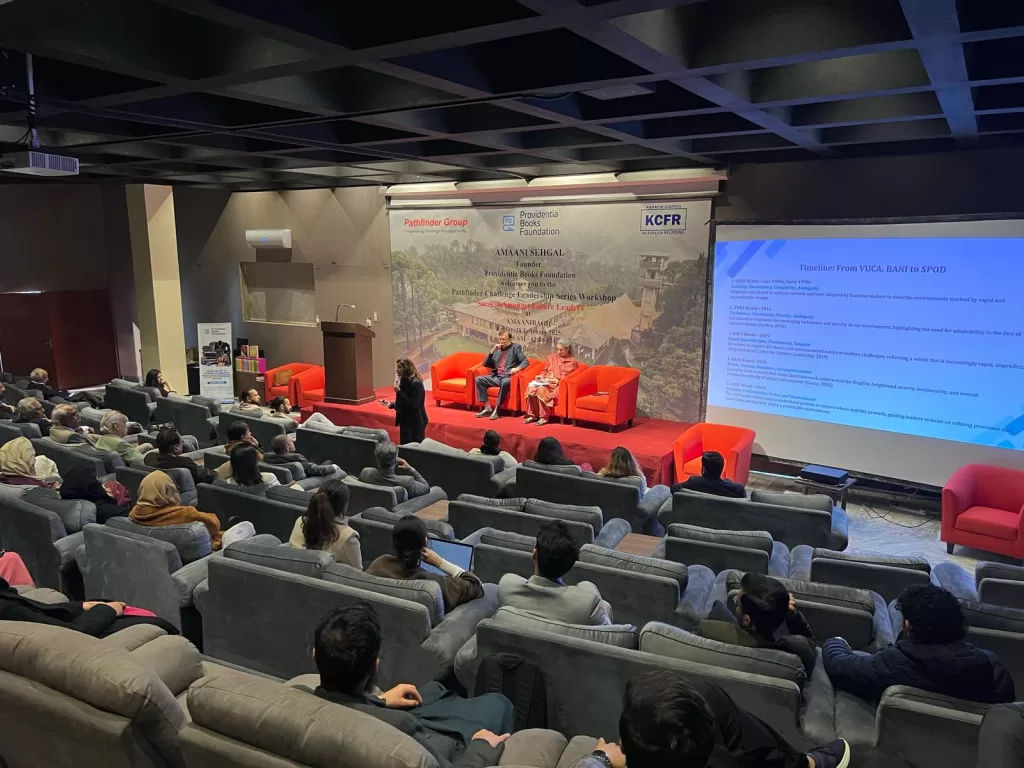
Ammara Awais Member BOG, The University of Lahore
First of all, I am grateful for this opportunity to speak to all of you. My name is Amara, and it’s unfortunate that not being there physically to present my agenda in front of you. However, I’m looking forward to your feedback. What I’m about to present is inspired by a book published in 2021 by Liedy Klotz., called Subtract, Focus and Thrive. Through experimentation, we’ve taken some of its concepts forward, and I’m excited to present to you a brief experiment we’ve been conducting it is called Subtract, Focus and Thrive. The motivation behind this was simply understanding that we live in a world of excess, too much is available for consumption, experience and processing but at the same time for many of us, it also expands the scope of opportunities available to us. Opportunities exist in daily life, education, and additionally in our professional careers. So, how does this alter our worldview, objectives, ambitions, aspirations, and goals in life?
The experiment which I would’ve physically conducted if I was there, is simple: participants are asked to define where they want to be in five years. They write down six attributes or goals that they envision for themselves within the next five to seven years.” Since this is a recorded session, I am going to present a case that represents feedback from one of the participants of our Youth Student Guild. Afterwards, they will be asked a simple question about why they want these six attributes, and they have to answer it in one simple sentence. Finally, they were told to subtract, more on that later. For example, one of the participants from our study, a young mother pursuing higher education, was asked a simple question: where does she see herself in the next five years? She responded with six attributes she wanted to see in herself:
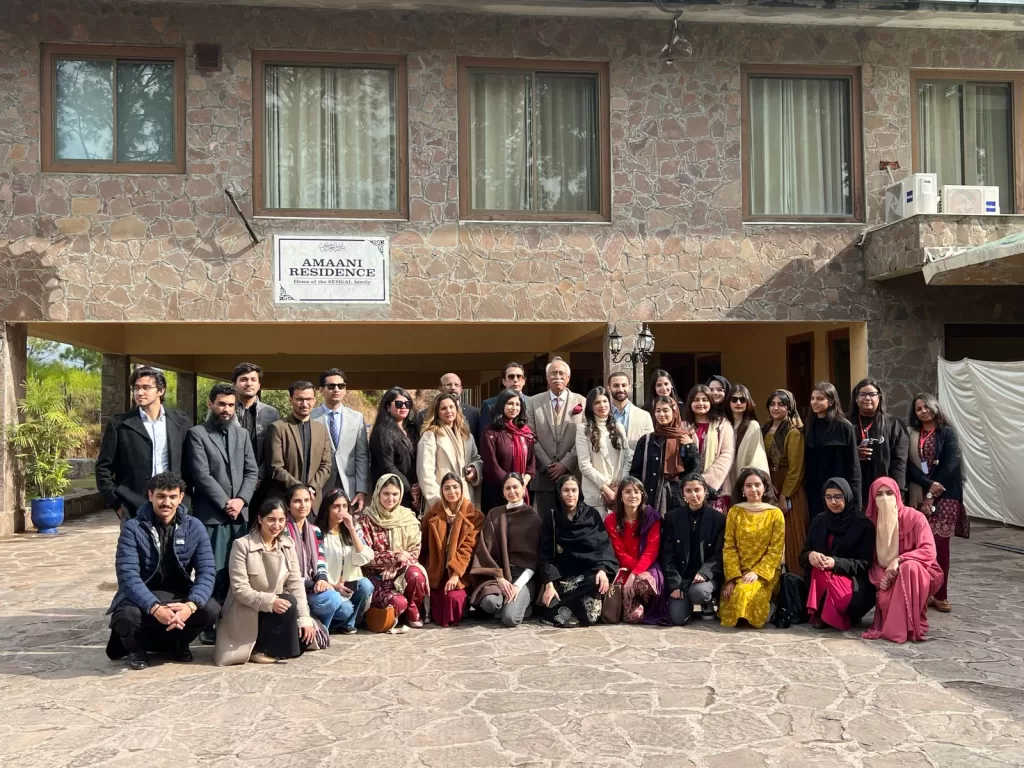
1. She wanted to be a successful entrepreneur.
2. She aimed to gain command over multiple languages (likely due to the nature of her work).
3. She wanted to be punctual with her prayers, as she is a practicing Muslim and values spirituality deeply.
4. As a young mother, she aspired to be a good mom within the next five years.
5. She wished to pursue an additional degree in her case, a PhD (as she was already an MPhil graduate).
6. Finally, she wanted to be a multiple income stream earner to support a better standard of living.
Later, she was asked why she had chosen these attributes. She simply replied “Because there is always a need for improvement” However, in the next step we asked her to subtract three attributes. We did not tell her to prioritize them in ascending or descending order, we just told her to completely remove three.
Her final decision was:
• She removed “command over multiple languages.”
• She let go of the goal of attaining a PhD.
• Lastly, she removed “multiple income streams,” her quest for earning more money.
The three goals she retained were:
• Entrepreneur
• Be punctual with prayers.
• Be a good mother.
This thing needs to be noted that when we are left with these three attributes from her, that does not change the “Why” statement, because she will continue to improve herself. Perhaps, she will be more focused towards these three things because she will not be subtracted by those other three attributes that she was aspiring for in the beginning, and she can also continue to thrive by improving herself. Why we are talking about this? The book which I have mentioned earlier has a very ordinary cover which says that the author believes in the “Untapped sides of less” By seeking inspiration from this book this test was designed. We don’t subtract because through evolution we are trained to add biological, cultural and economic forces that also push us towards enquiring more.
There is another interesting principle of subtraction which must be shared is that we overlook less, whether we are building or cooking, thinking or composing and when we are organizing our companies, days and ideas. Whenever we try to change how things are going and how we want them to be. This is an interesting concept that we are so used to the broad horizon that we have and making an effort to acquire everything but at times we lose focus on the foundational principles that we must believe in. Perhaps it’s not about the six vast attributes that are mentioned above, maybe it’s just those three things which we need to focus on. I shared this idea and informally engaged with many youth communities. While it’s not a formal research project. I feel this exercise helps trainees go through the process of first adding everything to their list and then subtracting what’s unnecessary.
Many of you might not believe that “less is more,” but the beauty of the subtraction concept lies in its ability to distil and focus on the most important core values. Through conscious subtraction, we can funnel down and reach the foundational principles that truly matter. While some of you will become leaders, others will be followers and that’s perfectly fine. This leadership capacity-building, training programs are not designed to make everyone a leader in everything. Nobody expects this all from you. These programs, development courses, initiatives, and opportunities are there to build your capacity so you can lead effectively in areas where you can become an expert. You must have the capacity to lead effectively and follow successfully when the situation arises. Subtract the excess, focus on the necessary, and thrive for the outcome of it all and also lead in areas in which you choose to excel. Honestly, the universe does not expect you to lead in everything that comes your way, it’s against the laws of nature. I hope there’s a positive takeaway, and if you have any questions, comments, or queries, feel free to drop me an email, and I’ll be in touch. If you get the chance to read that book, just go through one or two chapters to grasp the essence of it. Thank you very much.
Dr Salma Malik (Moderator)
We also have a video message from Dr Omar Khalid on media and leadership. Omar Khalid Butt has been associated with PTV World since its inception in 2013. He obtained his MBBS from the Rawalpindi Medical College, followed by a Gold Medal in his MSC Mass Communications from NUML. He holds the distinction of hosting news and programs in both Urdu and English, as well as special transmissions and exclusive interviews (from the former Malaysian PM to the Hungarian FM, The Commonwealth SC among others), along with various live events at the Prime Minister’s House and The Presidency. He currently hosts two shows on PTV World, “Newsroom” and “Diplomatic Enclave”.
Dr Omer Khalid Butt, Anchor – PTV World
Bismillah-ir-Rahman-ir-Rahim, Assalamu Alaikum. My name is Omar Khalid, and I’ve been associated with the media for the past two decades. I started as a news anchor, then moved on to hosting programs, and before I knew it, time had flown by. When I was asked to speak about leadership in media, I reflected on how its meaning has evolved for me over the years. In the beginning, when I started my career, leadership in media was embodied by the head of the channel or the organization. It was about how they maintained their personality and built a positive environment for people in the network. As I gained more experience, I realized that leadership in media goes beyond formal titles. It’s not just about the head of the channel but about how each person conducts themselves whether you’re at the desk, hosting a program, doing research, or managing production. Leadership in media requires integrity, sincerity, and passion. Without these principles, you cannot excel. They are fundamental to not only elevating yourself step-by-step in your career but also contributing meaningfully to the community and industry. In any capacity whether as a channel head or a researcher your conduct and dedication define your effectiveness. With that said, sometimes media professionals write, and sometimes they rewrite history. I encourage you to take the lead and present your ideas with authenticity.
Dr Salma Malik (Moderator)
We are going to now play a video message from Ms Ameera Adil. She is a feminist climate activist and educator dedicated to creating meaningful change in the field of intersectional climate change, committed to building up a generation that is well-informed, proactive, and resilient in the face of climate change. She is a special Initiatives Lead at Climate Vulnerable Forum (CVF) & Vulnerable Twenty Group (V20). She is currently the Islamabad CoChair for Women in Energy.
Ms Ameera Adil Special Initiatives Lead, Climate Vulnerable Forum
Assalamu Alaikum everyone. Let’s talk about something today that is going to define your future. Pakistan’s climate crisis. This isn’t just about rising temperatures and erratic monsoons. This is about survival, economic stability, and Pakistan’s place in the world. So, Pakistan contributes less than one per cent of global greenhouse gas emissions. This is an argument that you may have heard many, many times. But I don’t want you using this argument today. We are one of the most affected countries in the world in terms of vulnerability. But why? That’s because our geography makes us prone to floods, droughts, heat waves, and glacial melt. So, this is something that we’ve been experiencing for centuries. What does climate change do? Take the 2022 floods for example. One-third of the country was submerged underwater. 33 million people were affected, and we currently have 30 billion dollars in losses due to the floods. But climate change didn’t cause the floods alone. It was decades of poor water management, deforestation, and unplanned urbanization that exacerbated the process.
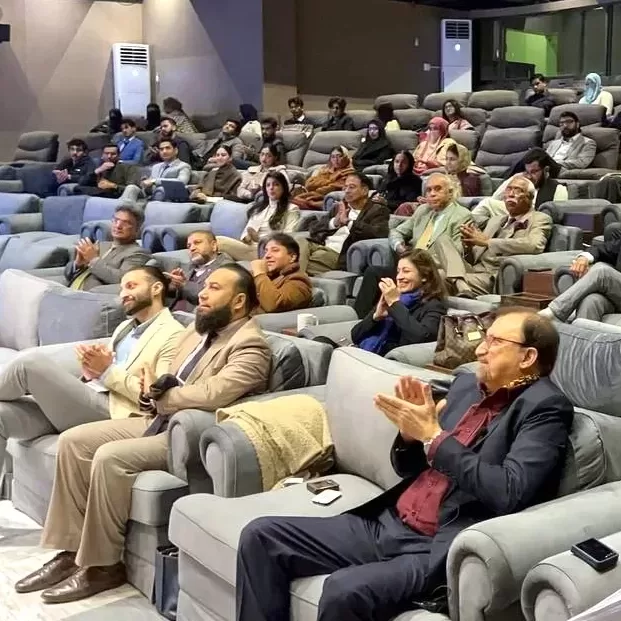
Now where does Pakistan stand globally? We’re caught in a paradox. We demand climate justice, arguing that big polluters like the US, China, and the EU should pay for the damages that their emissions have caused. Yet we also actively seek fossil fuel investments from the Gulf States and China under CPEC. Our economic crisis kind of forces us to prioritize short-term survival over long-term sustainability.
At global climate negotiations, we have very strong moral arguments but very weak leverage. Why? Because while we ask for climate finance, we lack the institutional strength to utilize it properly as well. What can Pakistan do? Three things. Restructure climate governance. So, we need climate policies that go beyond reports, speeches and conferences. Conferences on decentralized, locally driven adaptation strategies are needed, like community-based flood preparedness or water conservation. These are crucial.
One, the provinces and local governments must be empowered with real resources and decision-making power. Number two is economic realignment. Pakistan needs to rethink its energy mix. Instead of doubling down on imported fossil fuels, we need aggressive investments in solar, wind and hydro, particularly community-led decentralized microgrid solutions. And we also need to integrate climate resilience into our economic policies. So, climate-smart agriculture, water conservation and sustainable urban planning, need to become priorities, not just afterthoughts.
And number three, leveraging global climate finance. Pakistan needs to, or can position itself as a leader in climate adaptation in the global south. Instead of playing the victim card, we can showcase successful projects and demand debt restructuring based on climate vulnerability. We can turn climate finance into an economic bargaining tool rather than just charity.
What’s the bottom line? Climate change is not just an environmental issue in Pakistan, it’s an economic and political issue and more than that it’s an opportunity. If we fail to act, the next few decades are going to bring more displacement, more food insecurity and financial collapse. But if we play our cards right, we can turn our vulnerability into strength, leading the way in climate adaptation and resilience. The future isn’t written yet. The question is are we going to write it ourselves or are we going to let the climate crisis define it?
Dr Salma Malik (Moderator)
Now, we will proceed with the presentations from the four teams of students from Air University and Quaidi-Azam University.
Team Red: Nuverah Ansari from Air University and Muhammad Haseeb Sulehria from Quaid-i-Azam University covered the topic: Leaders of Character in a World of AI
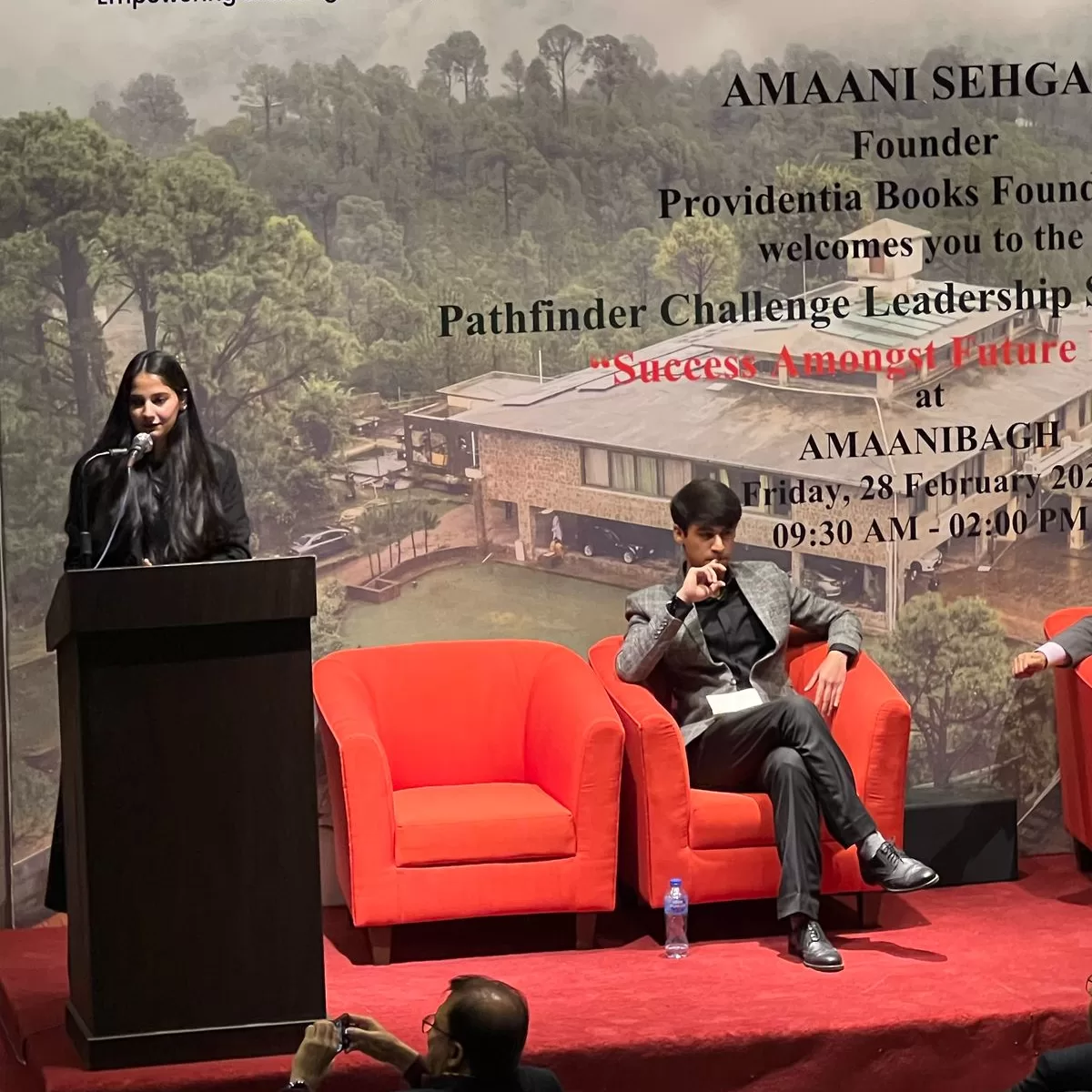
Nuverah Ansari: AI is revolutionizing the workplace, but with great power comes great responsibility. Leaders face pressing challenges: AI bias, ethical dilemmas, and automation’s impact on jobs. How can we lead ethically in an AI-driven world? AI bias can lead to unfair decisions.
Studies show facial recognition errors disproportionately affect darker-skinned individuals. Leaders must audit AI for fairness and ensure diverse training data. Without ethical safeguards, AI can go wrong. Microsoft’s chatbot, Tay, had to be shut down within 24 hours. Leaders must establish clear ethical guidelines and accountability.
AI will displace jobs, but it will also create new ones. The key? Reskilling. Companies like AT&T invest billions in upskilling programs, ensuring employees transition successfully. A hybrid AI-human decision-making framework balances efficiency with ethics. AI can analyze data, but humans must have the final say. Organizations like IBM already practice this with AI ethics boards. Ethical AI leadership fosters trust, inclusivity, and innovation. By auditing AI, setting clear guidelines, and investing in reskilling, leaders can shape a fair and sustainable AI-driven future. The choice is ours—let’s lead with integrity.
Muhammad Haseeb Sulehria: Today, I stand before you to discuss “the character of leadership,” a quality that defines not only the success of individuals but also the fate of nations. Leadership is not just about authority or commanding others—it is about inspiring, guiding, and making difficult decisions for the greater good. True leaders possess integrity, resilience, vision, and the ability to unite people during times of uncertainty. Throughout history, figures like John F. Kennedy, Winston Churchill, Franklin D. Roosevelt, and Abraham Lincoln have exemplified these qualities, leaving behind a legacy that continues to inspire us.
Abraham Lincoln Leading with Integrity and Compassion
Abraham Lincoln, the 16th President of the United States, led the nation through its most challenging period—the Civil War. Lincoln’s leadership was defined by his unwavering moral compass and empathy for others. He believed that a nation divided could not stand, and his ability to bring people together, even amidst intense opposition, highlights his remarkable leadership. In his iconic Gettysburg Address in 1863, Lincoln stated: “Government of the people, by the people, for the people, shall not perish from the earth.” This profound message reflected his dedication to preserving democracy and ensuring equality for all. Lincoln’s ability to communicate a vision of unity and justice remains a powerful example of principled leadership.
Winston Churchill The Power of Resilience and Determination
When Britain stood on the brink of collapse during World War II, Winston Churchill emerged as a beacon of hope. His leadership was marked by resilience, unwavering determination, and the ability to inspire his nation during its darkest hours. Churchill understood that true leadership requires standing firm when others falter. In his famous speech to the House of Commons in 1940, Churchill declared: “We shall go on to the end, we shall fight in France, we shall fight on the seas and oceans… we shall never surrender.” Churchill’s defiance and commitment to victory galvanized the British people and demonstrated how a leader’s words can instil courage in the face of adversity.
Franklin D. Roosevelt Vision and Adaptability
Franklin D. Roosevelt, often known as FDR, led the United States through two of its greatest crises—the Great Depression and World War II. His leadership was defined by vision, adaptability, and the ability to implement transformative change. Roosevelt understood that effective leadership requires not only addressing present challenges but also preparing for the future. In his first inaugural address in 1933, Roosevelt famously said: “The only thing we have to fear is fear itself.” These words inspired a nation grappling with economic despair and instilled a sense of resilience and hope. FDR’s New Deal policies laid the foundation for economic recovery, showing that a leader’s vision can reshape the future.
John F. Kennedy, the 35th President of the United States, exemplified leadership that inspired change and encouraged civic responsibility. His charisma, vision for progress, and ability to connect with the public made him a symbol of hope and innovation. Kennedy believed that true leadership calls upon individuals to contribute to the greater good. In his inaugural address in 1961, Kennedy challenged Americans with these timeless words: “Ask not what your country can do for you—ask what you can do for your country.” This call to action ignited a spirit of service and highlighted that leadership is not about personal gain but about empowering others to be agents of change. While these leaders came from different eras and faced distinct challenges, they shared a common thread—an unwavering commitment to their ideals and the people they served. Their words and actions continue to resonate because they understand that leadership is not about popularity or power but about making decisions that may be difficult but necessary for progress.
Conclusion: A Call to Lead with Purpose
As we reflect on the character of leadership embodied by Lincoln, Churchill, Roosevelt, and Kennedy, we must ask ourselves—what kind of leaders will we become? Will we choose to inspire others with compassion and integrity? Will we have the courage to stand firm in the face of adversity? True leadership is not confined to positions of power; it is a responsibility we all share to create positive change in our communities and beyond. In the words of Winston Churchill: “To each, there comes in their lifetime a special moment when they are figuratively tapped on the shoulder and offered the chance to do a very special thing, unique to their talents.” Let us be ready when that moment comes. Thank you.
Team Yellow: Javeria Khawar and Usman Akhtar from Quaid-i-Azam University gave their presentation on Fear of Failure.
Javeria Khawar: Good morning everyone, our group is going to talk about something that holds a lot of us back—fear of failure. We all experience it, but the key is learning how to overcome it. Let’s dive in. Fear of failure is something we all deal with. It stops us from taking chances, trying new things, or stepping outside our comfort zones. But here’s the truth: failure isn’t the end—it’s a stepping stone.
As the saying goes, ‘Fear kills more dreams than failure ever will.’ The real problem isn’t failing; it’s not trying at all. Think about a time when fear made you hesitate. Maybe you didn’t apply for something because you thought you weren’t good enough. Maybe you had an idea but kept quiet, worried about what others might think. Fear of failure leads to self-doubt, overthinking, and playing it safe. But playing it safe means missing out on growth. Thank you all for your attention!
Usman Akhtar: Today, the biggest failure in life is going to teach you how to overcome the fear of failure. Fear is a universal experience, yet it often becomes the biggest barrier between us and our dreams. However, history proves that those who overcome this fear go on to achieve greatness. Failure is not the end; rather, it is a lesson, a stepping stone toward success.
One of the most powerful examples comes from the life of Prophet Muhammad (PBUH). During the early days of Islam, he faced immense opposition, isolation, and hardships. The fear of being alone, of being rejected, could have deterred him. Yet, he persisted, undeterred by failure, and today, Islam stands as one of the world’s major religions. His resilience teaches us that true success comes to those who rise above their fears and keep moving forward. Fear, in essence, is just a word—an illusion that holds us back. Those who dare to confront it are the ones who shape history. Pakistan has produced countless individuals who defied fear and achieved extraordinary feats. Ali Sadpara, the legendary mountaineer, conquered some of the world’s highest peaks despite the perils of nature. Malala Yousafzai, who stood against oppression, turned her greatest fear into a global movement for education. Even in literature, Jonathan Livingston Seagull symbolizes the triumph over fear, as he dares to fly beyond the limits others set for him. The truth is, success is not about avoiding failure—it is about embracing it, learning from it, and rising stronger. Those who conquer their fears become the torchbearers of change, proving that fear is never an obstacle but a test of our determination.
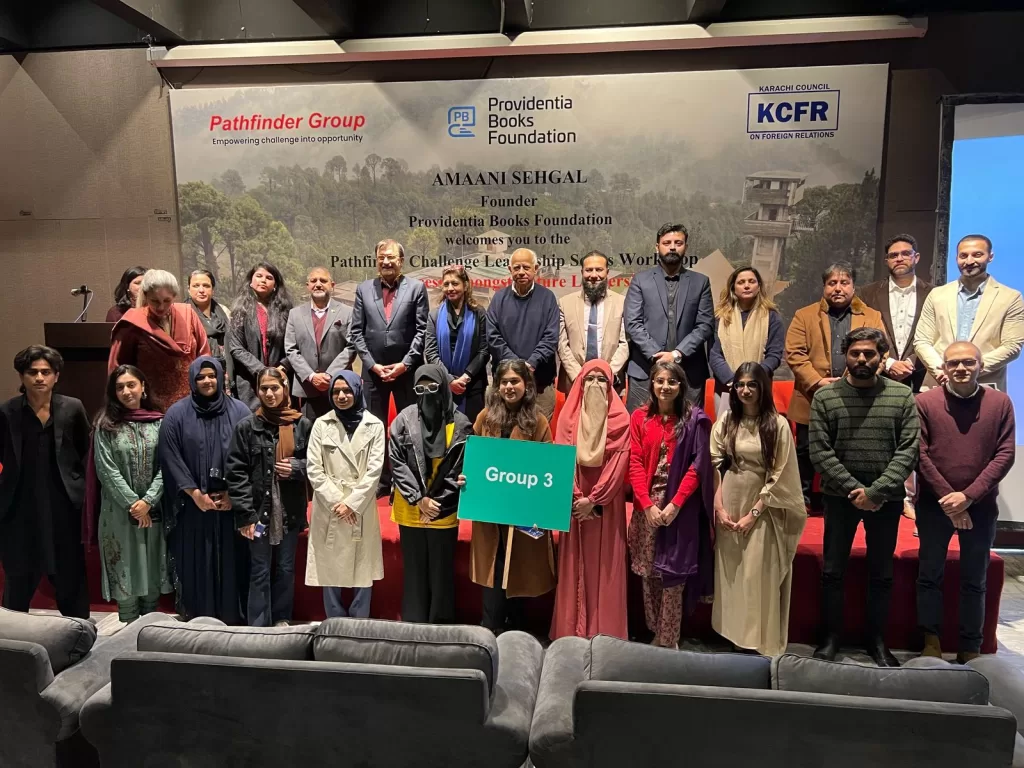
Team Green: Manahil Shahid from Quaid-i-Azam University and Alishba Rehman from Air University enlightened the audience with their presentation on Climate Change.
Manahil Shahid: Assalamoalikum everyone! This is Manahil Shahid from Quaid-i-Azam University representing Group 3 and our presentation is on climate change. “The oceans are rising, the forests are burning, and the skies are choking pollution. Nature is sending a message are we listening?” So let’s start with what is climate change. It can be referred to as a long-term transformation of Earth’s climate. It may be natural or driven by human activities such as deforestation, fossil fuel burning, rising temperatures etc.
Now the question arises How it’s a Global threat? To answer this we can see the world around us, the rising sea level, melting of glaciers, and not to forget about the disrupted ecosystem. On a regional level we can see the destruction it brought in Africa- the droughts, and in Asia- the floods.
The consequences of climate change are not limited to this, as we know that it is a non-traditional threat and according to Barry Buzan non-traditional threats lead to traditional threats, but how? The non-traditional threats are somehow interconnected and result in a polycrisis. They work in a loop. To elaborate, imagine a place strongly affected by climate change, now people might opt for migration, when they migrate to another place they become a burden on the resources available there leading to competition between the resources and hence, once again back to the environmental crisis.
To resolve this issue, what we need to do is change our approach- we need to opt for a Domestic level approach, and localization of the issue. We need to try on an individualistic level because it does make a difference when collectively done. Adaptability with green skills is an important aspect that needs to be adopted, checking the consumption patterns and accordingly corporate social responsibility. We need to inject this into our educational curriculum too to include civil engagement; horticulture, forestry, home gardening etc. This will help with the capacity building as well. Which might increase the accessibility too. We should try and make efforts to shift from non-renewable to renewable energy resources at all levels. Moreover, aligning with SDGs is a significantly crucial element, so that the policies made follow all green rules.
Pakistan does have a Carbon marketing policy and a National climate change policy; they are really nice but the issue lies in their implementation. So, my dear fellows lets hold our hands together to counter this and start from our own-selves first. What you do makes a difference and you have to decide what kind of difference you want to make – thank you!
Alishba Rehman: Pakistan is on the frontlines of climate change—facing floods, heatwaves, and environmental degradation. Despite contributing less than 1% to global emissions, we bear the brunt of its consequences. The G7 nations have long benefited from industrialization, fueling climate change. While compensation for climate damage is just, if that’s not feasible, then at the very least, Pakistan deserves a Carbon Development Budget—a structured financial plan to help us transition to a greener future. This is not aid; it is an investment in global stability. A Carbon Development Budget would allow Pakistan to build renewable energy infrastructure, protect vulnerable communities, and ensure that economic growth does not come at the cost of environmental destruction. Without this support, our future is at stake. We must act now. Climate justice is not a privilege—it is a necessity. The world cannot afford to leave Pakistan behind.
Team Blue: Inshal Haider from Quaid-i-Azam University and Rahat Arshad from Air University. The topic they covered was, Being an Effective Leader in the Workplace.
Inshal Haider: Leadership is the ability to inspire, influence, and guide a group of individuals toward achieving a shared goal, utilizing a combination of comprehensive skills and sound decision-making. In contemporary workplaces, a significant deficiency in effective leadership qualities has become increasingly evident. One of the primary factors contributing to this issue is the generational gap between employees and their superiors, which often leads to a lack of mutual understanding of ideas and perspectives. In many cases, younger employees are not given adequate opportunities to present their ideas. Even when such opportunities arise, their contributions often lack implementation, encouragement, or acknowledgement from leadership. This disconnect stifles innovation and trust within teams. Furthermore, several challenges persist in workplace leadership, including:
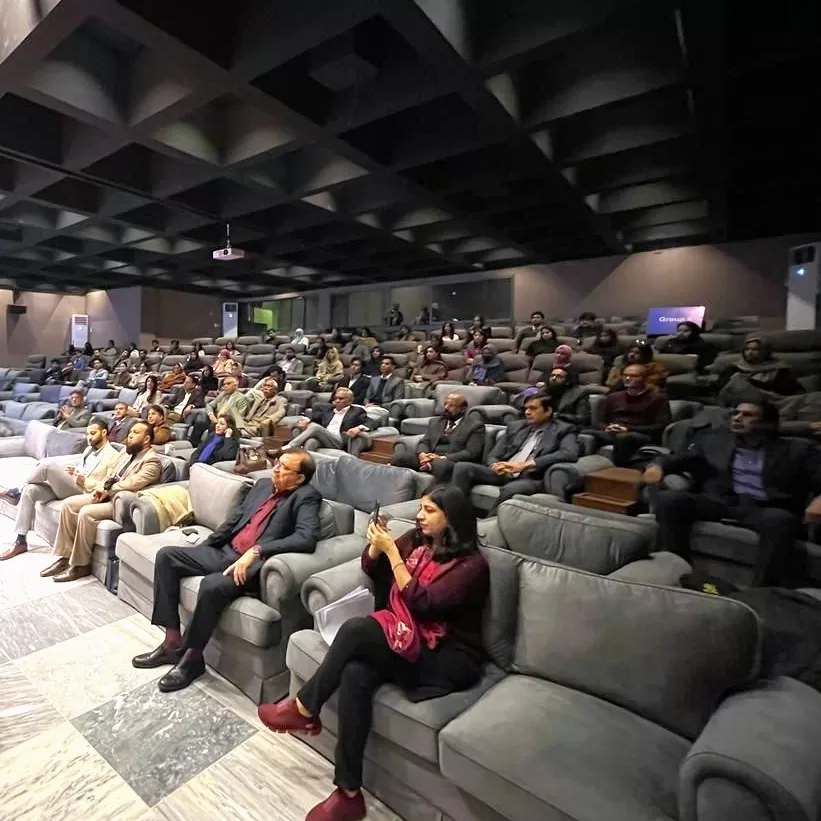
Employee Retention and Recognition: Limited opportunities for growth and a lack of appreciation often result in feelings of isolation and mental health concerns.
Empathy and Understanding: A deficit in empathy, relatability, and trust negatively impacts employee morale.
Human Connections: A lack of genuine human interaction leads to discomfort and disengagement.
Key Research Findings on Leadership Challenges Include
1. Leadership Loneliness: Studies report that 52% of CEOs experience loneliness, while 61% feel isolated (CC1, 2019).
2. Impact of Isolation: Isolated leaders are more prone to burnout, ineffective decision-making, and diminished teamwork.
3. Social Connectivity: Leaders with strong social connections demonstrate greater effectiveness and job satisfaction.
4. Financial Impact: Disengaged employees cost organizations an estimated $450–550 billion annually. Addressing these issues requires a commitment to fostering inclusivity, nurturing trust, and promoting open communication between leaders and employees. Prioritizing empathy and cultural understanding will strengthen organizations and enhance collective success.
Rahat Arshad: The conversation around workplace challenges often becomes too relatable, reflecting discussions we’ve had with our families, friends, and colleagues. Identifying these issues is crucial for leaders, as they must address and resolve them effectively. One key solution is effective communication, ensuring that the audience is both receptive and responsive. This can be established by shifting from a transactional leadership style to a servant leadership approach, which emphasizes approachability and accessibility. Instead of merely giving orders, a leader should sit with their team and work alongside them, fostering collaboration and trust. A 2008 study by Goleman and Boyatzis found that leaders with strong social connections are more likely to inspire and engage employees, reinforcing the importance of building relationships within the workplace. Additionally, providing a margin of error allows for acceptance and understanding, creating an environment where employees feel safe to take risks and learn from their mistakes.
Recognition plays a crucial role in employee retention. According to HR Cloud’s 2023 study, employees who feel recognized are 63% more likely to stay at their workplace. A great example of this is Mr. Ikram Sehgal, who took the time to thank his entire staff, including those working behind the scenes, for their efforts and contributions.
A leader naturally attracts followers and does not operate with ego but rather seeks to understand and connect with their team. While a manager focuses on getting the job done, a leader nurtures and harvests potential within their team. When young leaders finally get their opportunity, they should adopt a leadership style that is unafraid to engage, interact, and understand. By doing so, they set the foundation for a workplace culture that values communication, recognition, and collaboration, ultimately leading to a more effective and motivated workforce.
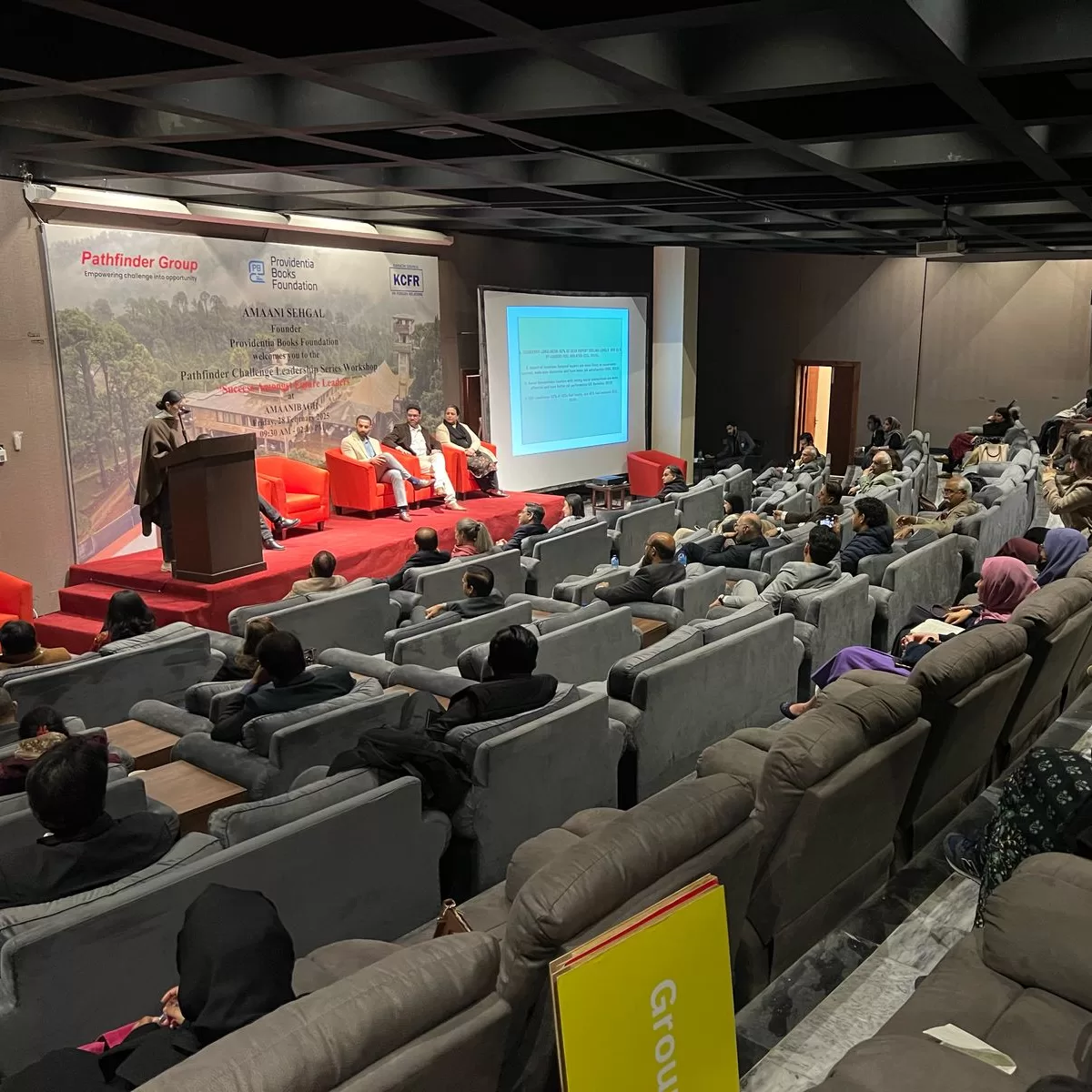
Dr Salma Malik (Moderator)
With that, we are now inching closer to our conclusion of today’s session. I’d like to invite Sehrish Mustafa to take over, as she has been instrumental in organizing this session. Sehrish has done a tremendous job, much more than we witness in real. Her work is like the tip of an iceberg mostly unseen, but immense in its depth and impact.
Sehrish Mustafa (Moderator) Thank you so much Madam, for your kind words. As we approach the end of today’s event, I’d like to invite three speakers for closing remarks. First, I’d like to call Dr Huma Baqai, Rector of MITE and Vice Chairperson of the Karachi Council on Foreign Relations.
Dr Huma Baqai, Rector – MiTE
This event has been a tremendous learning opportunity for me. Despite time constraints, I’d like to take a minute to request Ikram Segal to turn this series of workshops into a Leadership Academy. Pakistan currently lacks a Leadership Academy. I attended one in Germany, and it made a lot of difference. I humbly offer my services pro bono to become a part of this initiative.
We have got excellent presentations from the groups. I will quickly mention the efforts of each group. Firstly, the red team delivered an outstanding presentation. I have just one point for you: AI can never replace one extraordinary human being, at the end of the day it’s artificial intelligence and it is us who are going to use it. It’s us the human generation who turned something like nuclear energy into either a source of power or a weapon of mass destruction. Similarly, it’s up to this new generation to determine how AI will shape the world and I must say no leadership of tomorrow can be subtracted.
Now onto Team Yellow: another interesting presentation which was about the fear of failure, I’d like to note that failure can be fun it gives you alternatives and options. The most important aspect of failure is what you learn from it. It’s about trusting that Allah has an alternative plan for you. He sees the larger picture and helps you through your failures. All you need to do is hang on, work hard, give it your best, and leave the rest to Him.
Next, we have the presentation from the third group on climate change. Every time I listen to them, I realize that the tipping point isn’t just close it’s already here. While I and Talha were walking outside during the break, I couldn’t help but admire the greenery around me, which I don’t get to see often in Karachi. But Talha said something haunting to me: “Maybe in a few years, all of this will not be there.”
Even if we don’t do anything to harm the planet, destruction is inevitable unless we act. This highlights that the leaders of tomorrow must not only focus on AI and technology but also prioritize protecting the planet. Human beings have destroyed the planet like anything. One small request: let’s stop using plastic bottles. I’ve been trying to implement this in my institute as well to carry your own reusable glass or metal bottle instead, and I urge everyone to do the same.
Finally, moving on to Team Blue, our “angry team” One critical point they raised is the need to shift from a production-centric to a people-centric paradigm. Capitalism is often stuck in a production-centric paradigm but countries or organizations that are focused on their people and follow a people-centric paradigm grow sustainably. We can take here the example of Google. Success lies in linking personal and organizational growth. Without compassion for its people, no organization can truly thrive. We constantly hear about this generation not being heard, and I agree.
Sometimes it’s about adjusting the tone and volume of communication. But miracles do happen when new talent and knowledge merge with experience and expertise. Leadership of the future isn’t about a single leader it’s about rotational and transformational leadership paradigms, where the best-suited individual leads. Thank you so much.
Sehrish Mustafa (Moderator)
Thank you so much Dr Huma for your effective remarks, and now I like to invite Air Cdre Khalid Banuri for the vote of thanks.
Khalid Banuri: Let me start my list of thank yous, beginning with Ikram Sehgal in just one sentence, for this empowerment to convert a challenge into an opportunity. Thank you for that. Also, a heartfelt thanks to Amaani Sehgal, in absentia, for being a wonderful host of the event.
It is my pleasure to offer a very special thanks to our brilliant coordinator, Sehrish Mustafa and her wonderful team. A large number of individuals worked relentlessly behind the scenes – the logistics team, the organizers, the administration, and the security staff to guide the way to the venue.
A very special thank you to Dr Huma Baqai for her intellectually sharp and insightful session for us to understand the crisis in leadership, or leadership in crisis. Special thanks to Ms Ammara Awais for highlighting the focus through her recorded message and to Dr Omar Khalid Butt, a renowned media personality, for sharing his insights on leadership in media.
A big thank you to all the team mentors who guided the sessions: Asad Ikram and Shakaib for “AI”, Imran Jattala and Ayesha Malik for the “fear factor”, Talha Bhatti and Ayesha Jamil for “climate challenge”, and Salman Haider, Shehryar Naveed, and Neelofar Rauf, for the “leadership in the workplace” session. One cannot move further without acknowledging our very able moderator, for her clockwork efficiency. Gratitude is also due to Aiza Azam from Air University, who did a lot of spade work, ensuring smooth facilitation.
Acknowledging the group presenters: Team Red, Yellow, Green, and Blue who shone brightly. A shout-out to presenters – Nuverah, Haseeb, Javeria, Usman, Manahil, Alishba, Inshal and Rahat. A special mention also to Amira Adil for her recorded message addressing climate action. Last but not least, a huge round of applause for all BS students, particularly those from Quaid-e-Azam University and Air University, for their active participation. Recognizing the wonderful freelancers and think tank representatives, including Jehanzeb, Zulfiqar, Nasir and Ahmed. Thank you for your valuable contributions. And finally, my message to this remarkable audience: “You came, you heard, and you will benefit.” What remains now is how we reflect upon these issues, and more importantly, how we use them in the future. Thank you all.
Sehrish Mustafa (Moderator)
Thank you so much, sir. Now as I always say, a man who needs no introduction and I am pleased to invite the leader of leaders, Mr Ikram Sehgal.
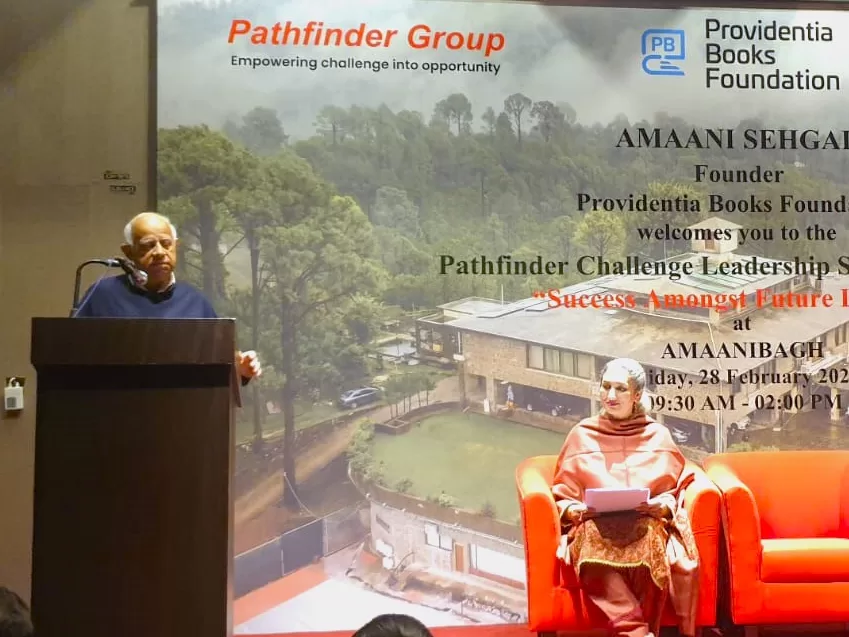
Ikram Sehgal Co-Chairman, Pathfinder Group
Bismillah-ir-Rahman-ir-Rahim. Thank you everyone for being here. I must first thank all those who worked tirelessly through the night to make this event happen which is my staff. There is no substitute for Pakistani talent, skill and dedication if you give them the right leadership. I can count a lot of people to whom we have taken to the World Economic Forum at Davos as an incentive. We took Raees from our ESS department this time to Davos because of his excellent performance. There were about twenty people who never went abroad in their lives, but we took them be cause of their performance. I cannot thank my staff because they are exceptional. It’s just about giving them the opportunity.
I can proudly say that we give an opportunity to many of the kids to study at Jajja Cadet College on fully funded scholarships. I must mention here the student, who was the son of our security guard, is now studying at Harvard and recently delivered a TED Talk by mentioning that how difficult time they have passed and then he went to Jajja where he got an opportunity to excel. I must say, if you throw a baby in a pool two to three times he will ultimately start to swim which shows the opportunity which you give to him.
I am very impressed with what I have seen today, to bring people of excellence together and make something better. Interestingly, the motto of my college (Lawrence College) is also “Never Give In” Dr. Kabir Sidhu, the Chairman of the Competition Commission of Pakistan, is well-versed in recalling this motto. The walls of the college also featured motivational quotes emphasizing the importance of loving the game, striving for excellence, and embracing challenges. We have learned a great deal from Lawrence College.
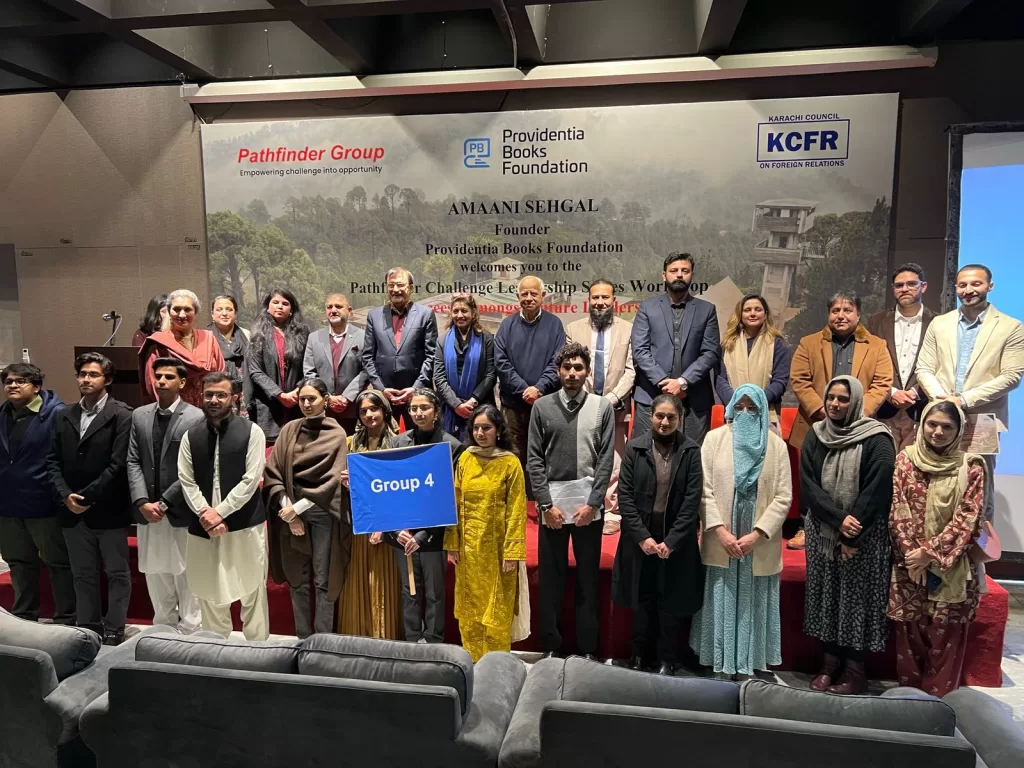
The key is to take ownership and think bigger; building a better future for the nation lies in the hands of those who are ready to seize opportunities and lead boldly—this is the youth of our country. This young generation can carry forward the legacy of Quaid-eAzam, focusing not on past failures, but instead learning from their mistakes to forge a successful future.
I would like to thank Khalid Banuri and Dr Salma Malik, I think through our combined efforts we can go forward at a better pace. We might not be able to make leadership academies, but we can establish virtual academies. The youth can do this all. I must mention here that once my daughter came to me and said “I cannot easily open a bank account; my driver is not able to open a bank account.” We set up another company and went through the hassle of the account opening process in banks. We made a platform by gathering expert people and developed the Asaan Mobile Account (AMA) which is unfortunately not recognized by the Pakistani government but is known internationally. Through this platform one can open an account in any of the 16 banks in less than 10 minutes through their normal cellphones other than the smart phones. This initiative of my company VRG was highlighted at the World Economic Forum. Now the PTA and State Bank of Pakistan are endorsing it. We are empowering the underserved communities by supporting 50,000 farmers to bypass middlemen, empowering them at all levels is the foundation of meaningful progress. They no longer need intermediaries; instead, with just a mobile device, they can request loans, purchase seeds, and acquire fertilizer. This approach significantly reduces costs, lowering prices and empowering farmers to thrive independently. People of our age have lived our lives, now the ball is in your court. Thank you very much.


